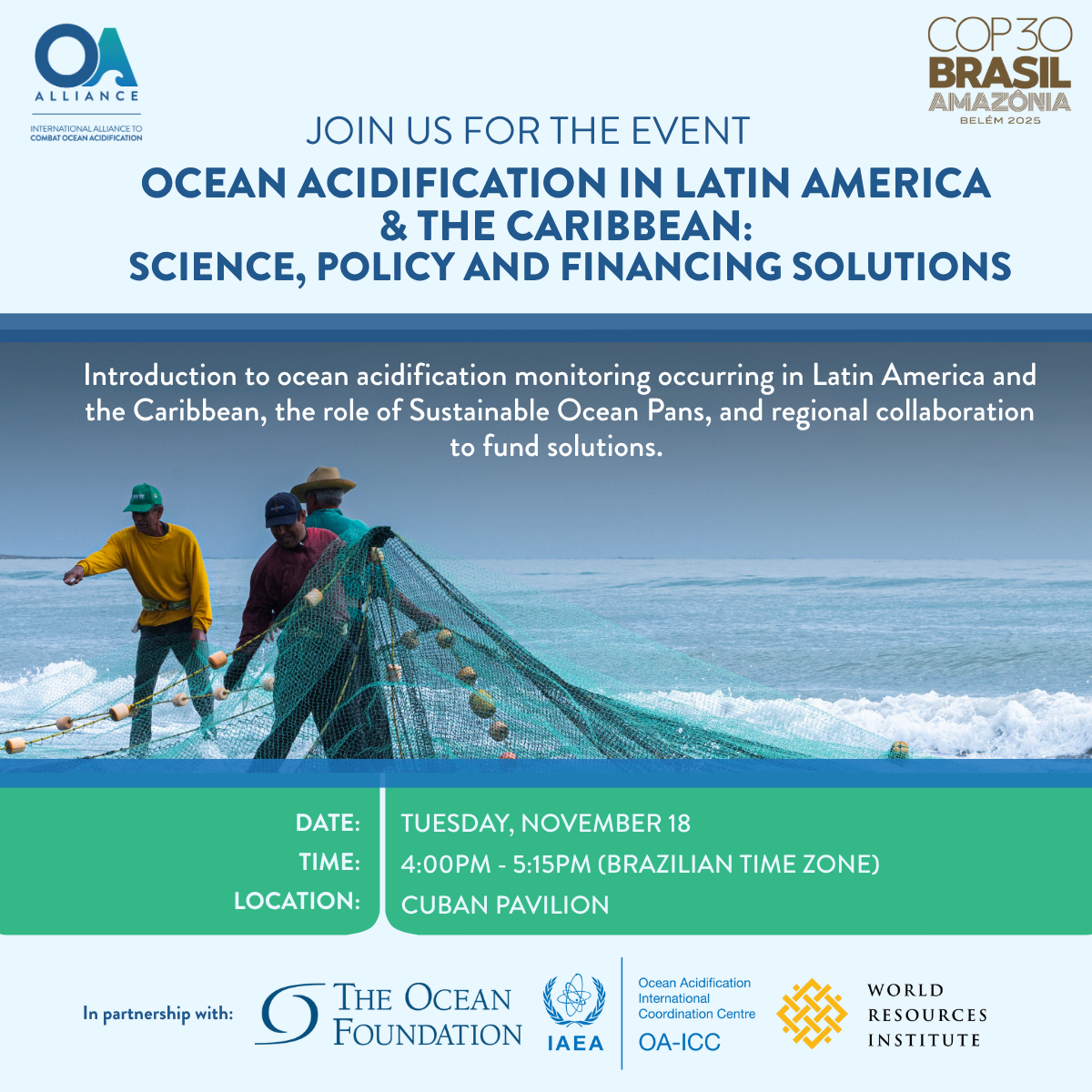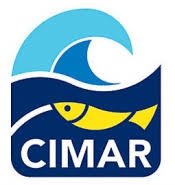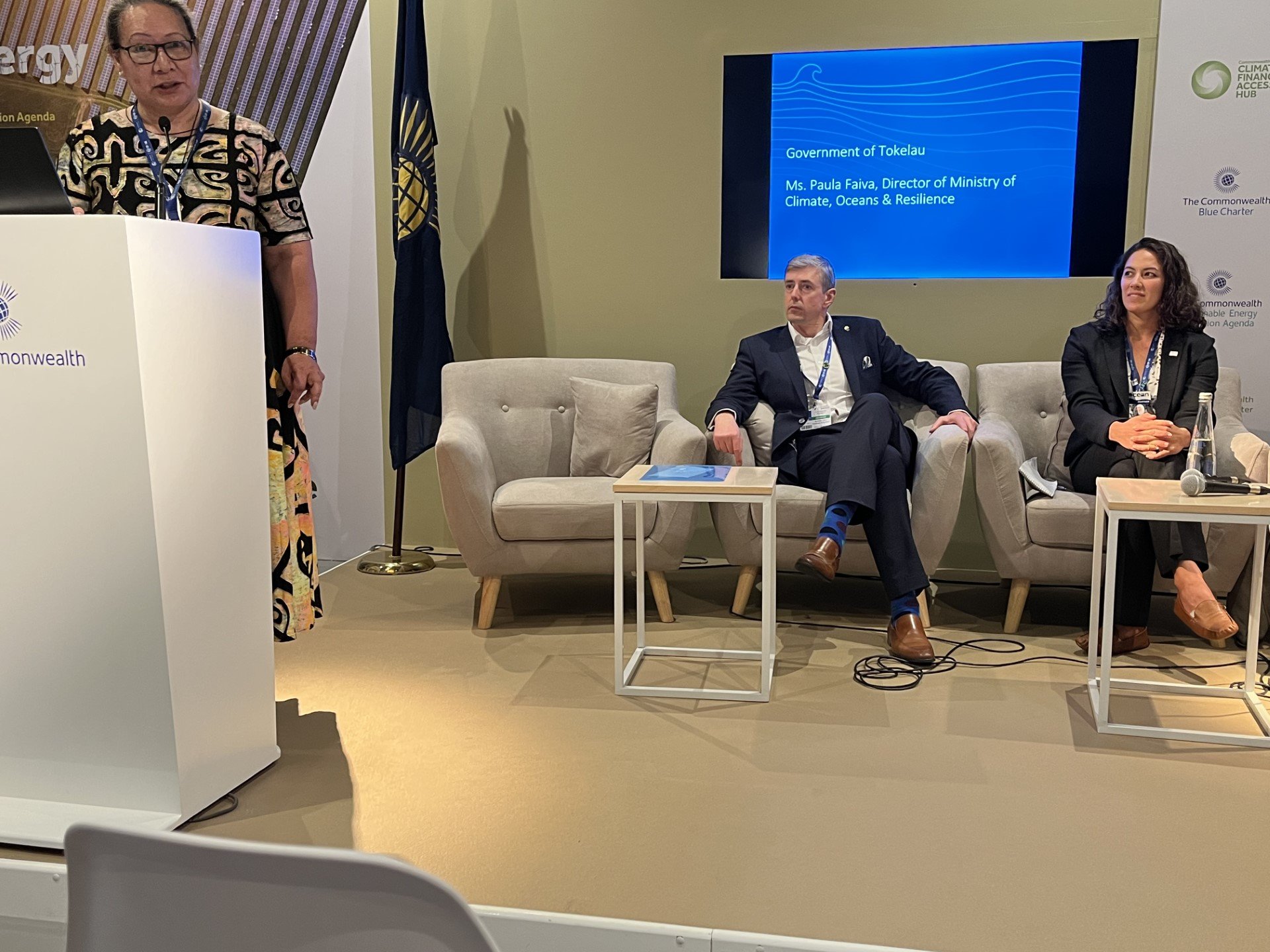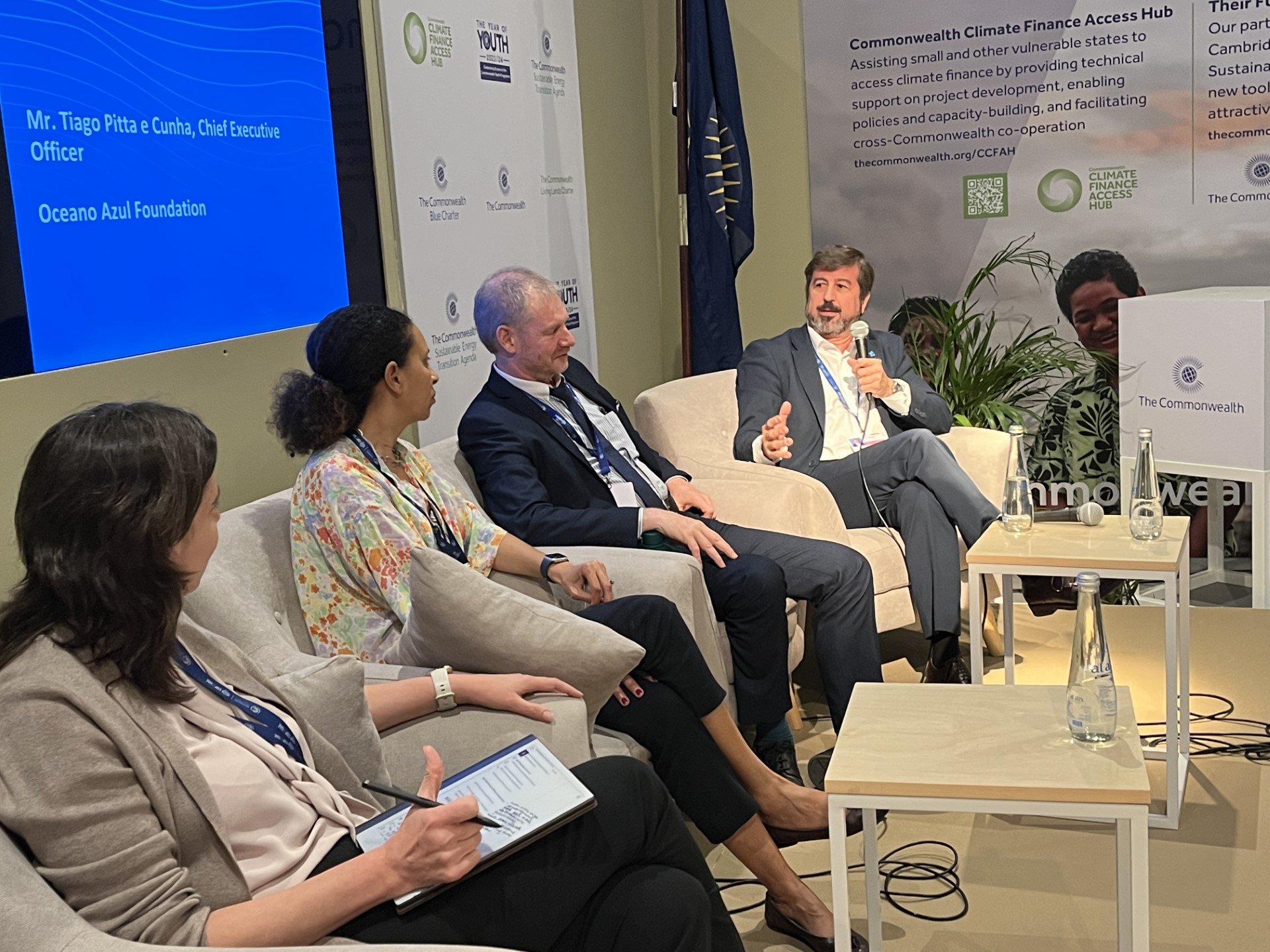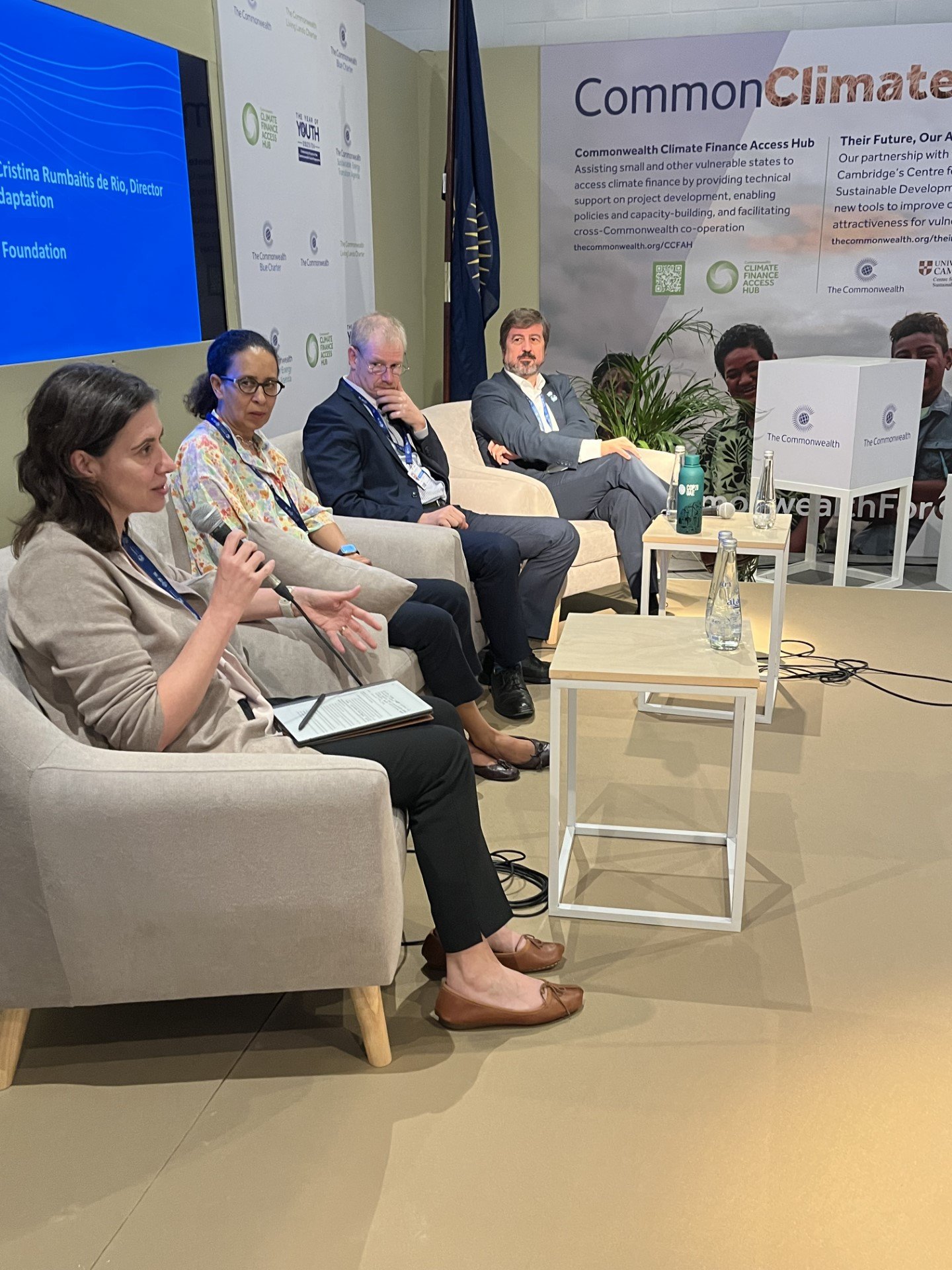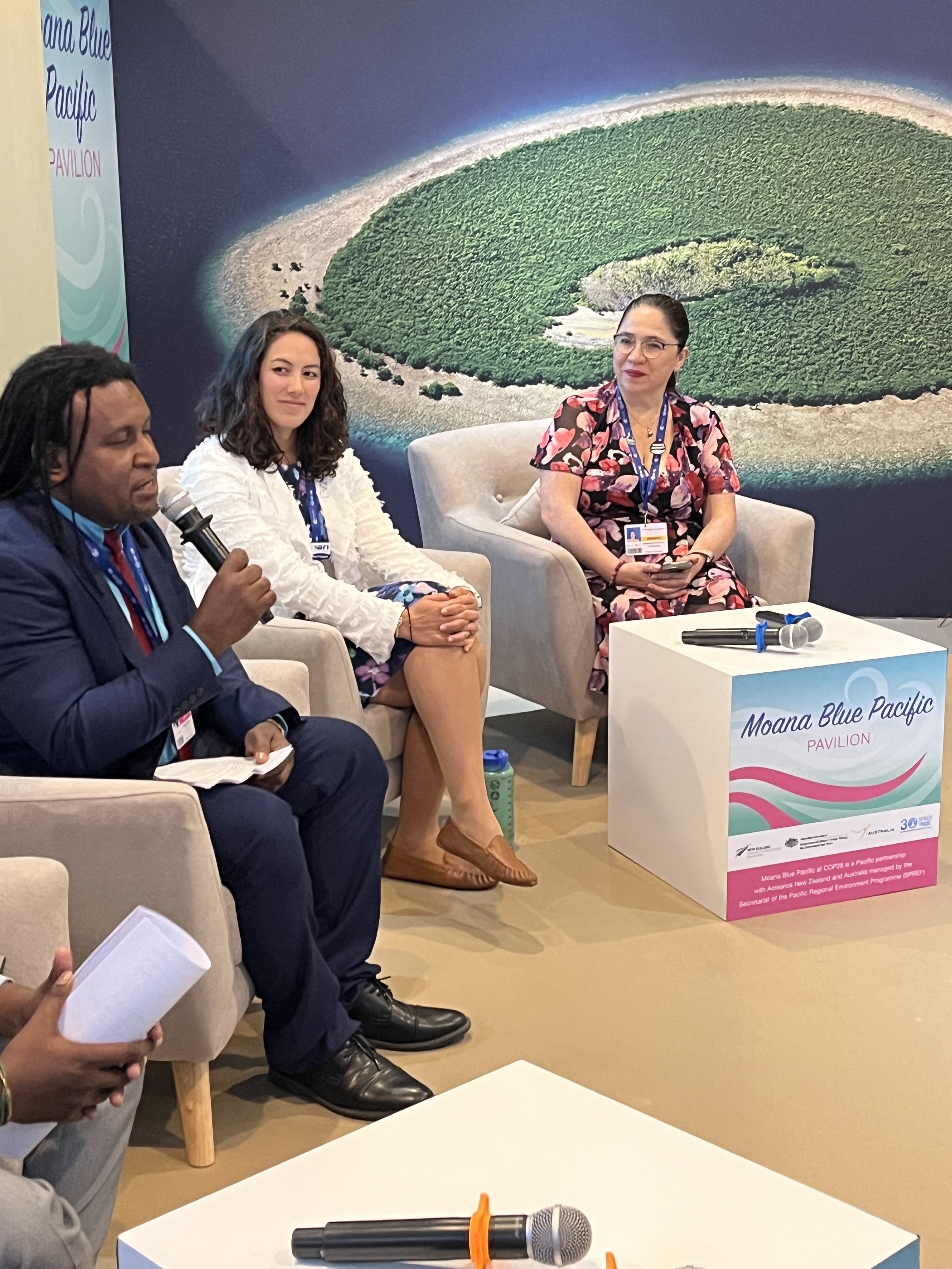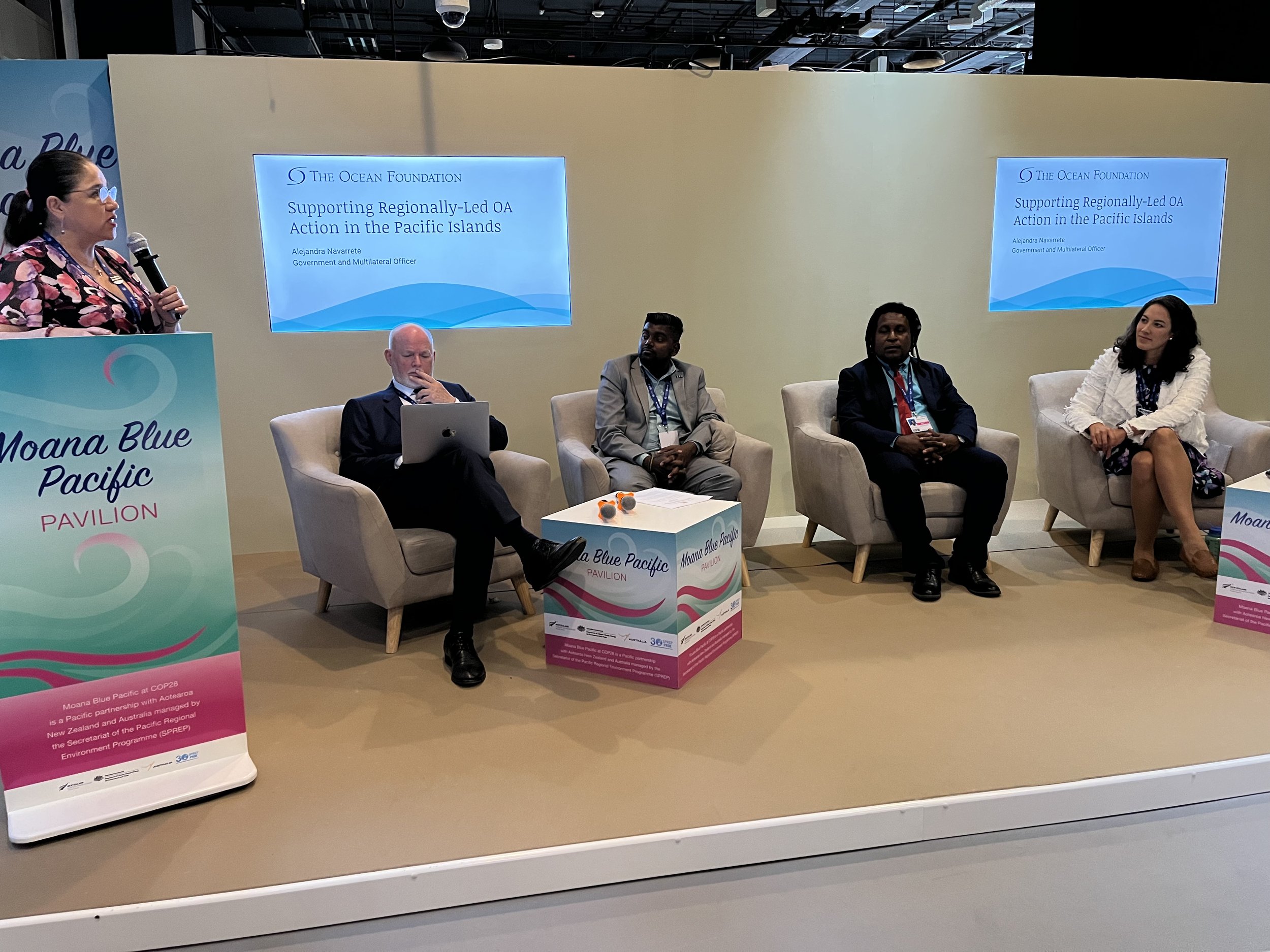events
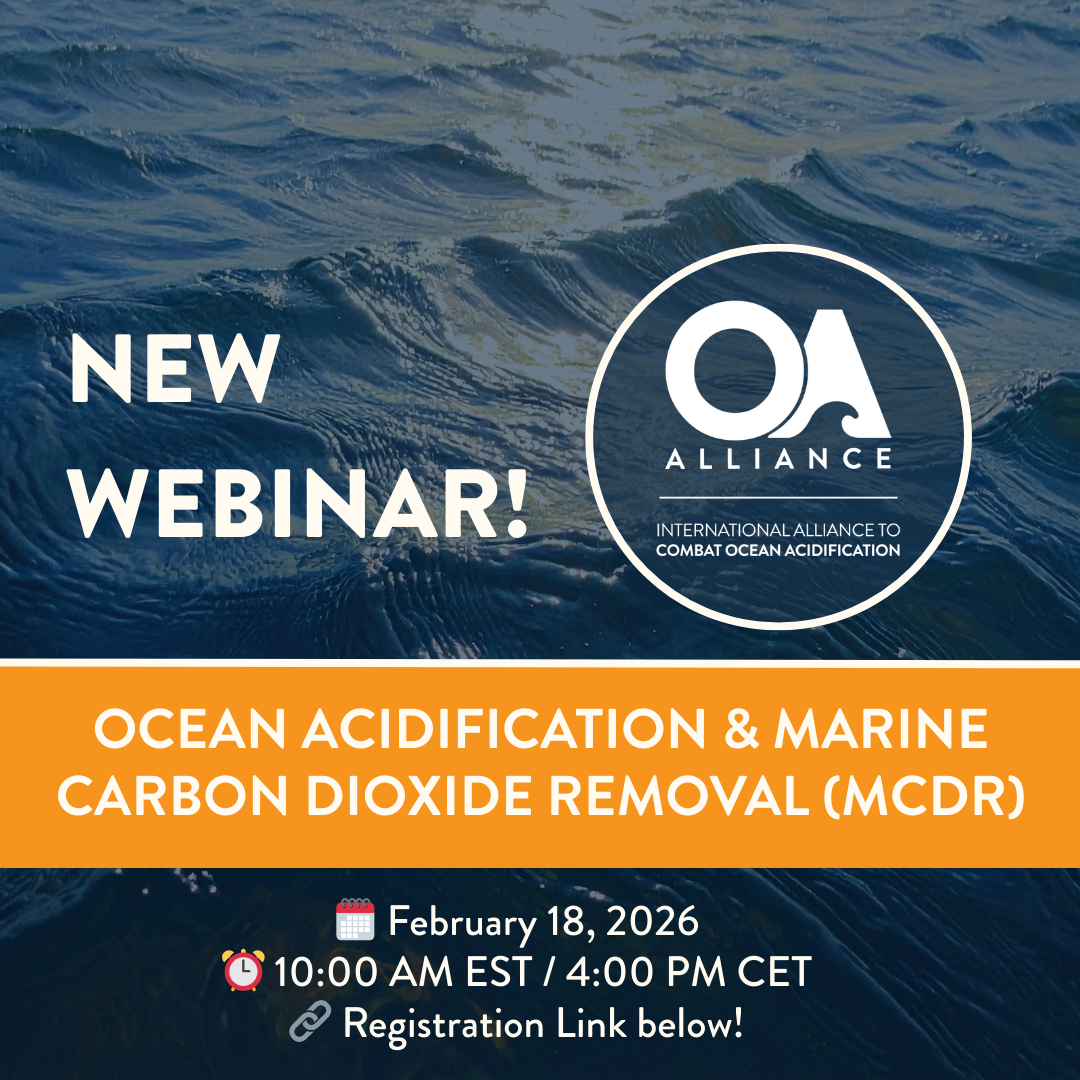
Webinar: Ocean Acidification and Marine Carbon Dioxide RemovalWebinar: Ocean Acidification and Marine Carbon Dioxide Removal
Halting the ongoing release of Anthropogenic CO2 and other greenhouse gas emissions is the first and most important action needed to combat climate change and ocean acidification. Increasingly, governments are being asked to consider marine carbon dioxide removal (mCDR) strategies as part of broader CDR agendas and as a direct response to ocean acidification.
To support government members of the OA Alliance who are navigating this nexus, the OA Alliance will release and discuss materials to help them understand the links between mCDR and OA— particularly, the state of the science, as well as how particular actions might achieve specific desired goals.
It is critical that governments are able to articulate the specific outcomes they may be seeking from mCDR strategies, as well as articulate any concerns, vulnerabilities, or capacity needs for evaluation.
Join us for a release of OA Alliance support materials and discussion with members and partners.
Date: Wednesday, February 18
Time: 10am EST/ 4pm CET
Link to Register here: https://unfoundation.zoom.us/webinar/register/WN_Nj8Hb5OSSBKdg-s-JVsMIw

Event rescheduled: Global Premiere of the Short FIlm “Changing Waters”
Join us for the film premiere of ‘Changing Waters: Time for Action on Ocean Acidification,” featuring OA Alliance members’ stories and experiences tackling ocean acidification and climate-ocean change in North America, Latin America and the Pacific Island Region.
Filmed in Washington State, Colombia, and Fiji, this character-led short film follows real individuals from government, indigenous communities, seafood industry, and scientists who are responding to the accelerating impacts of ocean acidification and calling for action.
The film aims to inspire broader awareness of this work and accelerate action at a critical moment for climate policy and financing.
The premiere will be followed by a short roundtable highlighting the science and policy leadership shown by Pacific Island countries. On all fronts, Fiji and the Pacific Island Region is leading the way on connecting applied ocean acidification science to policy and action.
Date: Wednesday 19 of November (the event had to be rescheduled due to severe weather conditions in Belem)
Time: 5:00pm - 5:50pm (Brazilian Time Zone)
Location: Moana Blue Pacific Pavilion at COP 30, Belem Brazil
In partnership with Ministry of Environment and Climate Fiji and Pacific Community

Virtual Premiere of the Short Film, Changing Waters: Time for Action on Ocean Acidification
Join us for the film premiere of ‘Changing Waters: Time for Action on Ocean Acidification,’ featuring OA Alliance members’ stories and experiences tackling ocean acidification and climate-ocean change in North America, Latin America and the Pacific Island Region.
Filmed in Washington State, Colombia, and Fiji, this character-led short film follows real individuals from government, indigenous communities, seafood industry, and scientists who are responding to the accelerating impacts of ocean acidification and calling for action.
The film aims to inspire broader awareness of this work and accelerate action at a critical moment for climate policy and financing.
The virtual premier will be followed by a short roundtable with the filmmaker as well as science and policy leaders featured in the film representing communities of practice across North America, Latin America and the Pacific Island Region.
Date: Wednesday, November 19
Time: 12:00pm - 1:30pm (Brazilian Time Zone)
Location: Virtual Ocean Pavilion
Link to Register here: https://us02web.zoom.us/webinar/register/WN_EFJ1RLJuRfy8AdvygCrm_w#/registration
If you’d like to explore the Pavilion’s virtual environment and access all its features including the Pavilion Events. The registration is through the register link on the COP30 Virtual Ocean Pavilion landing page.

Ocean Acidification in Latin America and the Caribbean: Science, Policy and Financing Solutions
Introduction to ocean acidification monitoring occurring in Latin America and the Caribbean, the role of Sustainable Ocean Pans, and regional collaboration to fund solutions.
The event will begin with a short film, “Changing Waters: Time for Action on Ocean Acidification,” featuring the current state of ocean acidification science in Latin America.
Filmed in Washington State, Colombia, and Fiji, this character-led short film follows real individuals from government, indigenous communities, seafood industry, and scientists who are responding to the accelerating impacts of ocean acidification and calling for action.
The film aims to inspire broader awareness of this work and accelerate action at a critical moment for climate policy and financing
A panel will then discuss:
Supporting regional capacity for monitoring ocean acidification and translating data into actionable policies.
Policy recommendations for aligning ocean management strategies response to ocean acidification.
Financial innovations and mechanisms to support the implementation of Sustainable Ocean Plans utilizing OA information in the region.
Date: November 18, 2025
Time: 4:00pm - 5:15pm (Brazilian Time Zone)
Location: Cuban Pavilion at COP30, Belem Brazil
In partnership with Ocean Foundation, Ocean Acidification International Coordination Center (OA-ICC), and World Resources Institute

Taking Science and Policy Action on Ocean Acidification
Fisheries and Oceans Canada and the International Alliance to Combat Ocean Acidification are proud to present this event celebrating leadership in ocean acidification science and policy. The event will spotlight actions taken across countries and emphasize the importance of addressing ocean acidification as part of the broader blue economy, including for seafood sovereignty and the sustainability of coastal livelihoods.
This event will open with a short film titled Changing Waters: Time for Action on Ocean Acidification and include a panel with national governments, the Tanzanian Fisheries Research Institute, and a representative of the Makah Tribal Organization sharing lessons learned in taking policy action on ocean acidification.
Date: Tuesday, November 18
Time: 12:15pm - 1:00pm (Brazilian Time Zone)
Location: Canadian Pavilion at COP30, Belem Brazil
In partnership with Fisheries and Oceans Canada

OA Week 2025: OARS Framework For Action
Join us at OA Week 2025 to learn about the OARS Decision-Making Framework Working Group which will focus on opportunities to promote the Framework at key events and utilize, apply or improve the framework across relevant projects and case studies in 2026.

OA Week 2025: Beyond Dissolving Shells: Innovative and Collaborative Ways To Improve OA Education
Join this session at OA Week 2025 to learn more about the OA Alliance’s Creative Communications program and present Carbon in the Current, a first-of-its-kind art + science project making ocean change visible and emotionally resonant.

Policy Action to Implement SDG 14.3
Join us for the release of National OA Action Plans and celebrate progress towards integrating ocean acidification across mainstream policies
The National OA Action Planning Leadership Circle includes 15 countries working together to advance policy action on UN SDG 14.3 “to minimize and address ocean acidification” and calls on more National Governments to join this effort.
To join us, please ensure you have
#ActionOnAcidification

Science to Action on SDG 14.3
The Ocean Acidification Research for Sustainability (OARS) programme is an endorsed programme of the UN Decade of Ocean Science, created in support of Sustainable Development Goal Target 14.3.
In order to encourage a diversity of ocean acidification actions, OARS has developed a framework for identifying useful information and co-designing ocean acidification projects that meet different decision-making needs.
This is an open event for all conference participants, specifically if you're a climate or ocean policymaker, fisheries manager, communications professional, scientist, community leader or anyone else who wants to learn more about Science to Action for UN SDG 14.3.
Join us!
#ActionOnAcidification

Carbon in the Current: Contrasting Futures for Our Changing Ocean
The OA Alliance, in collaboration with PangeaSeed and ETH Zurich, will present: 'Carbon in the Current: Contrasting Futures for Our Changing Ocean,' a 3D digital artistic animation conveying the impact of climate change on our ocean.
Carbon in the Current draws upon the ETH Zurich Ocean Acidification Stripes, an innovative project which uses a stunning spectrum of colorful stripes to visually represent the rapid rate of change in ocean acidification recorded by global and regional observations over the past 40 years.
Art makes science relatable, memorable, and motivational. By combining them, we aim to make the unseen impacts of climate-ocean change seen and emotionally felt.
This piece will immerses you in a vibrant digital animation that will enable you to see, hear, and feel what ocean acidification, caused by excess carbon emissions, means for marine resources and human communities.
Carbon in the Current will be released at UNOC 2025. the Digital release will be on World Ocean Day, June 8. STAY TUNED!
The video animation will be part of Tidal Shifts Exhibition,
Dates: 7-13 June 2025
Location: NEO GALLERY
6 bis rue Lascaris
06300 Nice, France
Opening Hours: 3pm–9pm
There is a lot at stake for the future of our changing ocean: we have a choice to act now for the future we want.
#ActionOnAcidification

International Ocean Seminar breakout session: Policies to Address Ocean Acidification
The OA Alliance in collaboration with the Intergovernmental Oceanographic Commission of UNESCO, Economist Impact Group, Plymouth Marine Lab, IISER University of Kolkata and the Sasakawa Peace Foundation will be hosting a breakout session at the International Ocean Seminar at Sasakawa Peace Foundation offices in Tokyo, Japan on Friday March 14th.
The programme will include a subcommittee meeting on policies to address ocean acidification the Asia Pacific Region. On the heels of the of the 12th annual World Ocean Summit and Expo, this subcommittee session will bring together science practitioners, policy makers, private sector, and relevant finance institutions across The Asia-Pacific Region to accelerate the coordination of ocean acidification science and action across climate, marine and sustainable development portfolios such as UN 2030 Agenda.
Discussion with invited participants will focus on the following:
What regional entities are best designed to coordinate and integrate OA science across core policy portfolios?
What financing institutions are most aligned to support this work?
Developing an Action Taking Roadmap (1-3 years) for pan-regional countries
If you are interested to join please RSVP your interest here:
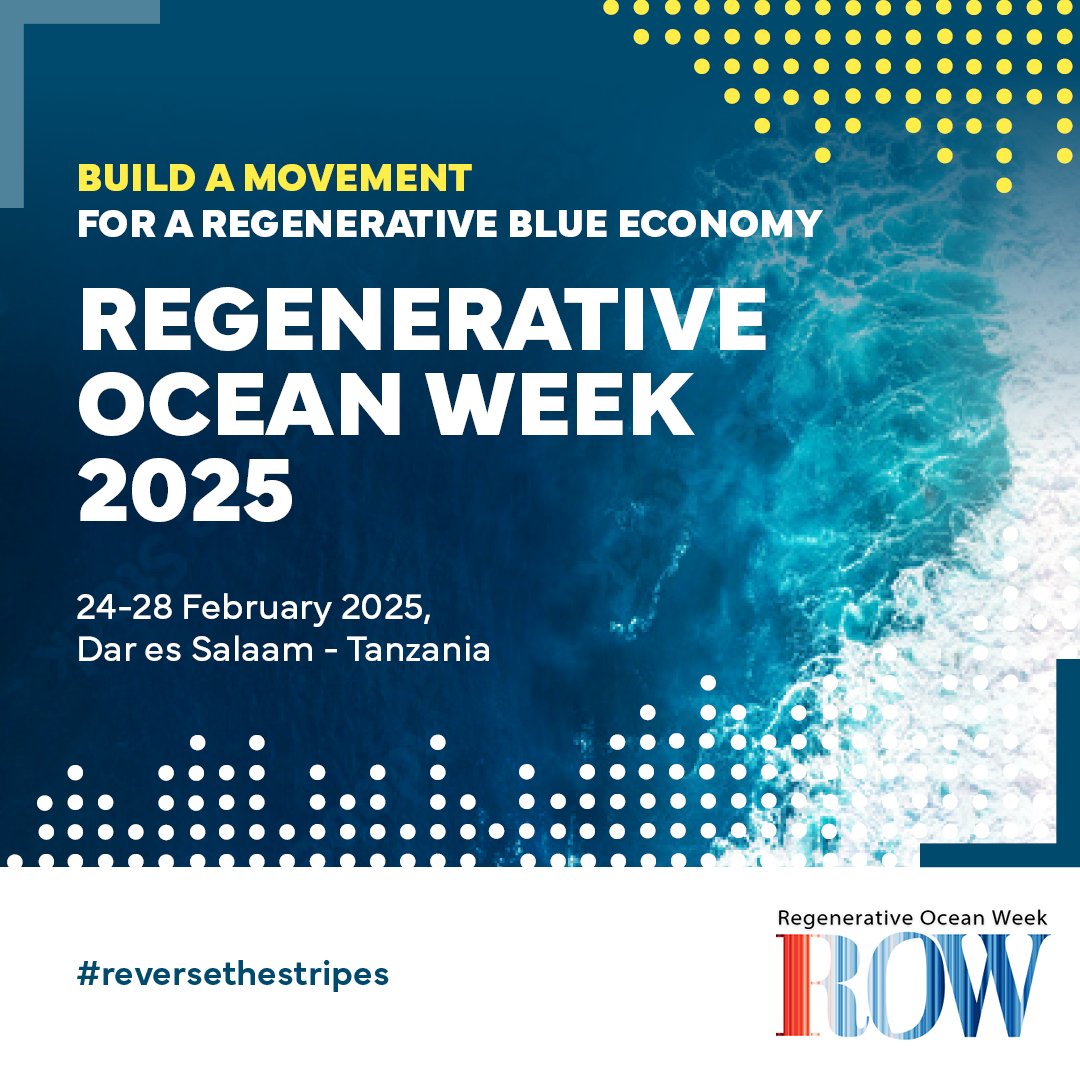
Designing a Regional Ocean Acidification Program for the Western Indian Ocean: A Model for the Continent.
The OA Alliance will host a closed door meeting
"Designing a Regional Ocean Acidification Program to Support Climate, Marine and Blue Economy Goals in the Western Indian Ocean.”
Taking place during Regenerative Ocean Week/ Ocean Innovation Africa Summit in Dar es Salaam, Tanzania the OA Alliance will host a closed door meeting, "Designing a Regional Ocean Acidification Program to Support Climate, Marine and Blue Economy Goals in the Western Indian Ocean,” on 24 February between 2:00pm-3:30pm EST.
The meeting will build on discussions about an OA Action Plan under the Nairobi Convention and how such a programme might align with AUC policy goals and inform other regional programs across the continent.
Participants will:
Provide feedback on the draft “Ocean Acidification Programme” being purposed under the Nairobi Convention.
Identify synergies for connecting the “Ocean Acidification Programme” across relevant AUC policies, including appropriate blue economy forum of the AUC such as the 2063 Blue Economy Plan and the Blue Economy Reference Group (BERG).
Identify opportunities for the “Ocean Acidification Programme” to contribute to AUC Dashboard for Blue Economy.
Strategize next steps in reaching to funding entities like Green Climate Fund and further institutionalizing this work across relevant climate, marine and blue economy projects.
We hope that you are able to attend or to send a representative from your organization or Ministry to participate.
Please RSVP to Jturner@unfoundation.org with your confirmation.

Climate-Ocean Change and Food Security @ COP29
On behalf of the UN Foundation, Commonwealth Blue Charter Secretariat and the OA Alliance, please join us for the side event, “Climate-Ocean Change and Food Security,” set to occur on November 15 between 4:30pm-5:30pm at the Commonwealth Pavilion.
Ocean acidification is a direct result of the greenhouse gas, carbon dioxide, which is altering the chemical balance of seawater that marine life (like shellfish, finfish and coral) need to grow, reproduce, and thrive. Combined with other impacts of climate change like ocean warming and reduced oxygen levels, marine species and ecosystems are under increasing stress.
Come learn about the emerging science, policy and financing needed to fully understand and respond to climate-ocean change and ocean acidification’s impact on food security.

Incorporating Ocean Acidification Across Mainstream Climate-Ocean Policy @ COP29
Please join us for the side event, “Incorporating Ocean Acidification Across Mainstream Climate-Ocean Policy,” set to occur on November 13 between 9:00am-10:00am at the Ocean Pavilion. Hosted by the UN Foundation, World Resources Institute, and the International Alliance to Combat Ocean Acidification in collaboration with the High-Level Panel for a Sustainable Ocean Economy.
Building on the leadership of the United States’ release of the U.S.National Ocean Acidification Action Plan at COP28, this side event showcases the work of the National OA Action Planning Leadership Circle, launched in April this year.
The event will showcase Leadership Circle government members’ efforts to incorporate ocean acidification science, mitigation and adaptation aspects across mainstream policy documents including:
(1) Nationally Determined Contributions and National Adaptation Plans. (Here)
(2) Sustainable Ocean Plans. (Here)
(3) Marine Strategy Framework Directive (for EU member states). (Here)
The Leadership Circle is supporting invited Ministries, departments and policy officers across 14 countries in the development and implementation of unique commitments to domestic OA activities, leading to increased national implementation of UN SDG 14.3 “to minimize and address OA” by the 3rd UN Ocean Conference in 2025.
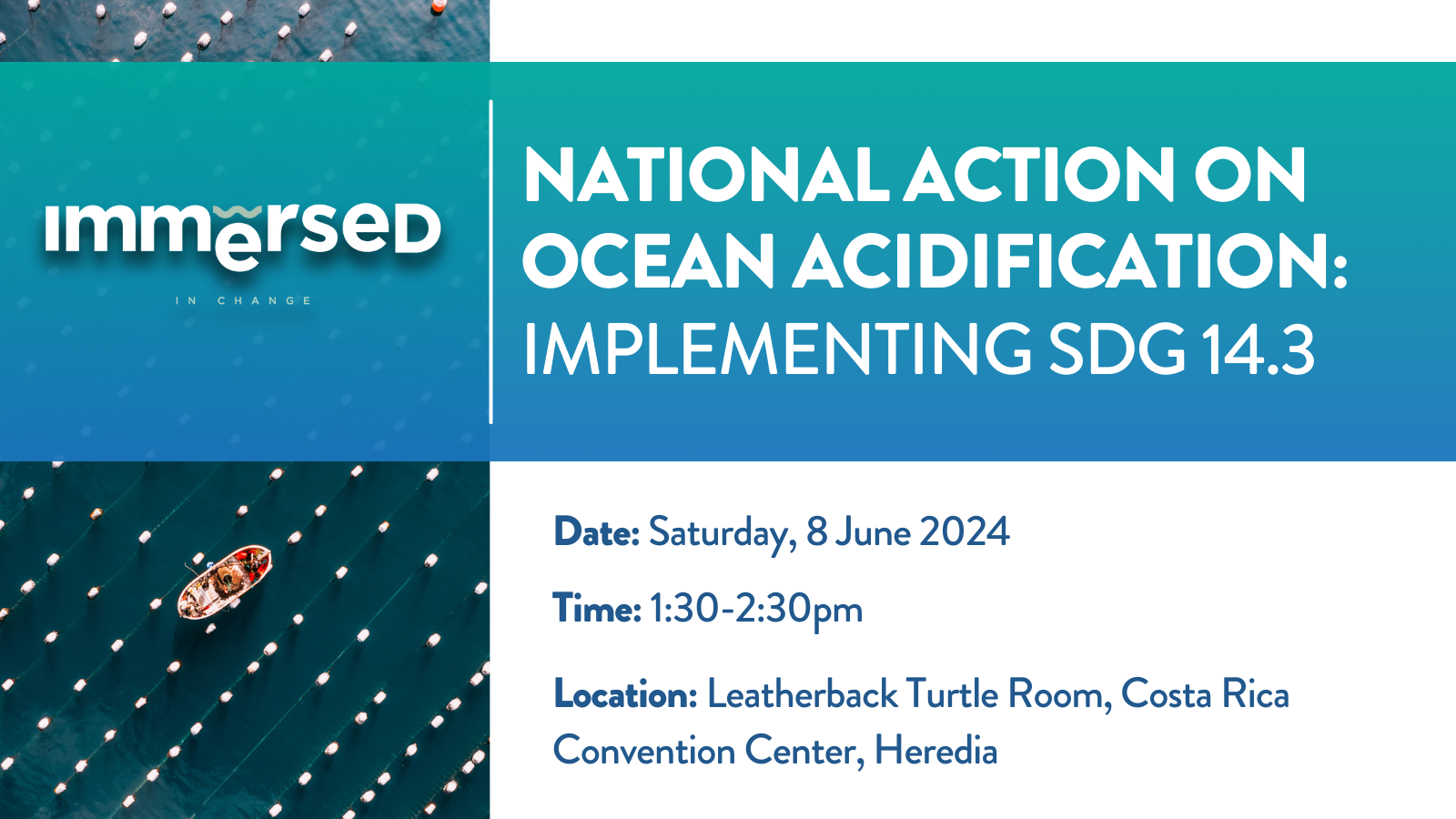
Join Us at the Immersed in Change Conference!
The world is waking up to the threat that ocean acidification (OA) poses to marine ecosystems and to the coastal economies that depend on them. OA is a rise in the acidity of seawater caused by an excess of anthropogenic carbon dioxide emissions (CO2) being absorbed by the ocean.
To implement SDG 14.3 “to minimize and address ocean acidification”, OA must become a cross cutting issue embedded across climate, ocean, and marine policies.
Advancing national OA actions will inform better decision making for achieving domestic mitigation, adaptation, and resilience goals.
Come learn about the National OA Action Planning Leadership Circle, where invited governments are finding their unique approach to OA Actions across 2024-2025, leading to national implementation of UN SDG 14.3 “to minimize and address OA” by the 3rd UN Ocean Conference in 2025.
Stay for OA Poetry to celebrate World Ocean Day!
Confirm your participation to Jcorrales@unfoundation.org
Co-Hosts:

#OAHaiku Poetry Campaign for UN World Oceans Day 2024
Following the UN World Oceans Day 2024 theme Awaken New Depths, the OA Alliance is releasing the first ocean acidification (OA) #OAHaiku social media campaign!
We tapped into the creative minds of our network to increase visibility of OA, climate-ocean impacts and responses. The #OAHaiku poetry campaign provides an opportunity to access the wisdom, expertise and life experiences that have shaped individual contributions to climate-ocean action.
During the month of June, we are encouraging everyone to get involved in the #OAHaiku poetry campaign on Twitter/X @OA_Alliance!
Guidelines for the campaign are available below, for your ongoing participation and amplification throughout the month. It includes a link to access several image templates for you to utilize when advertising the campaign through your channels, retweeting or posting your own #OAHaiku poem.
Help us awaken new depths of communication and connection by joining the #OAHaiku poetry campaign and celebrate the people working to protect our ocean from the ongoing threats of climate change!
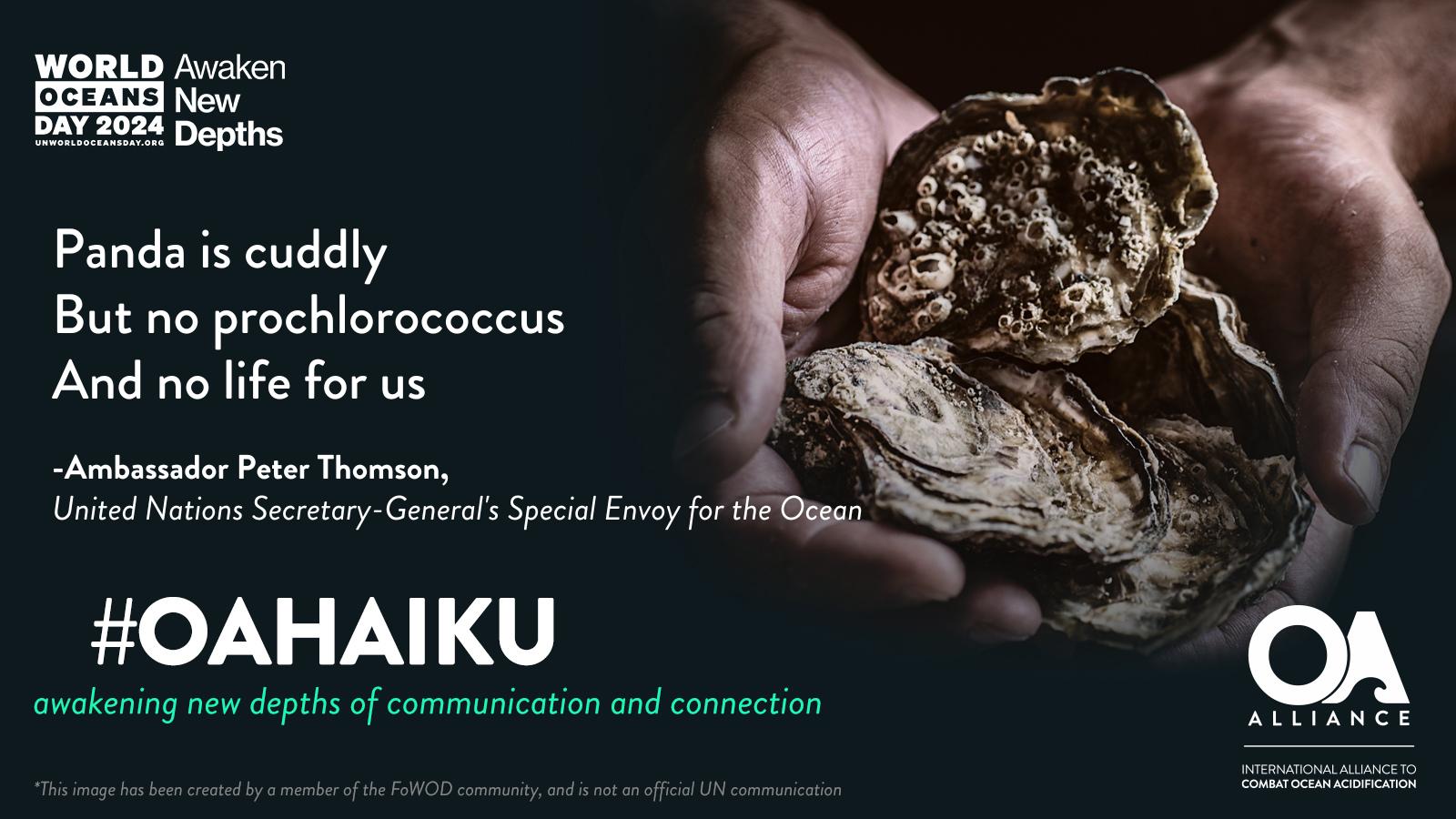

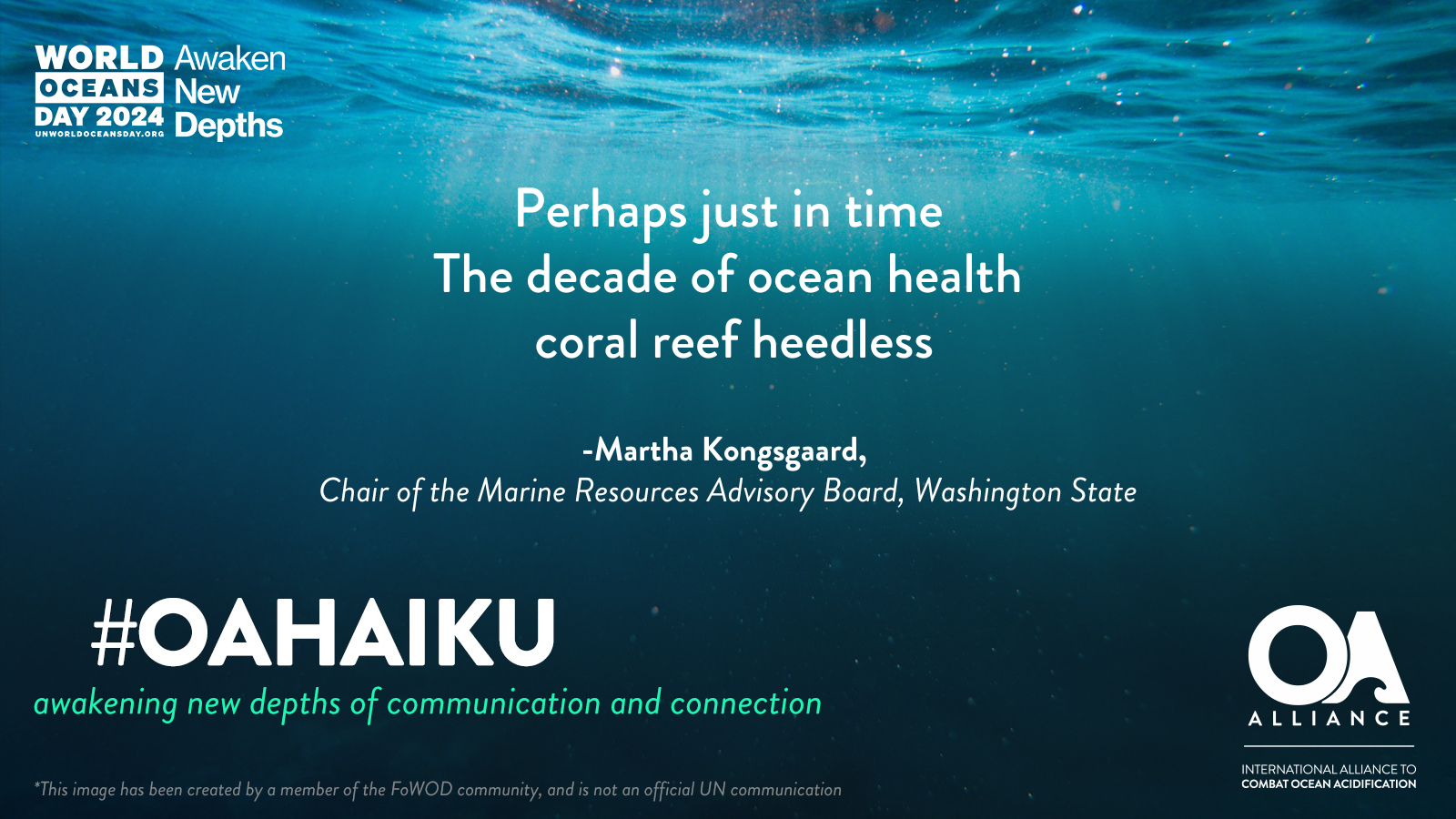



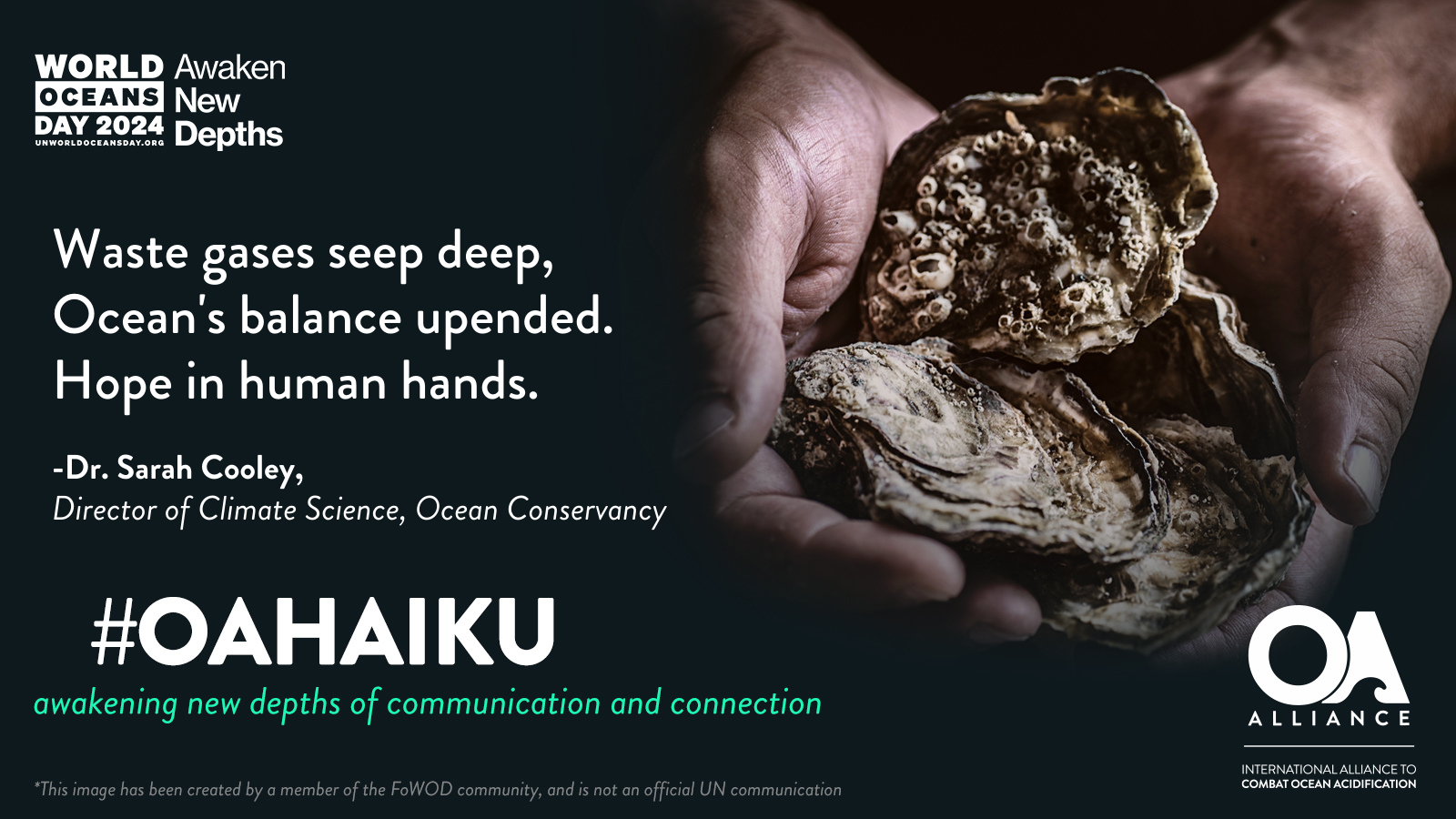



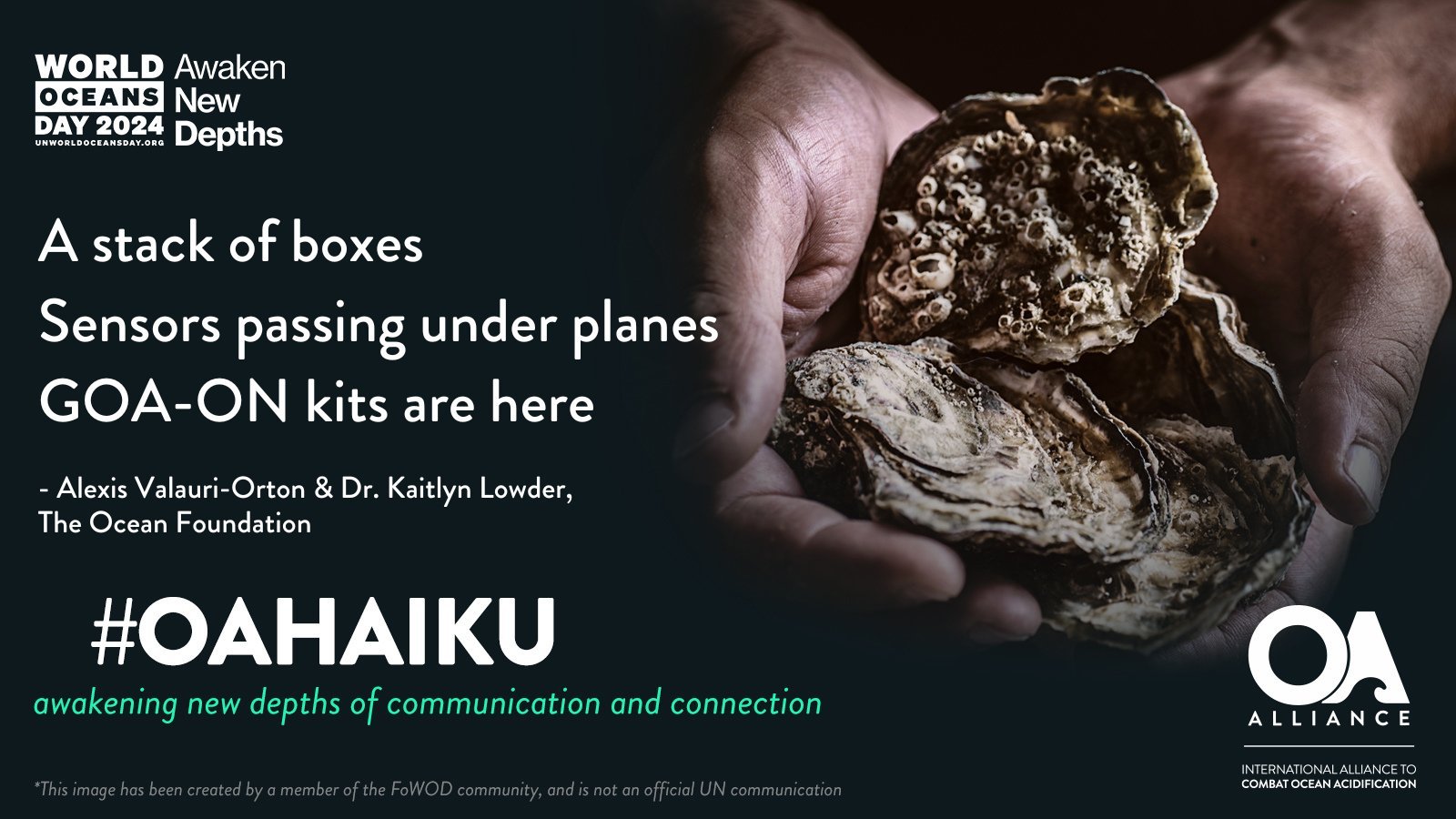
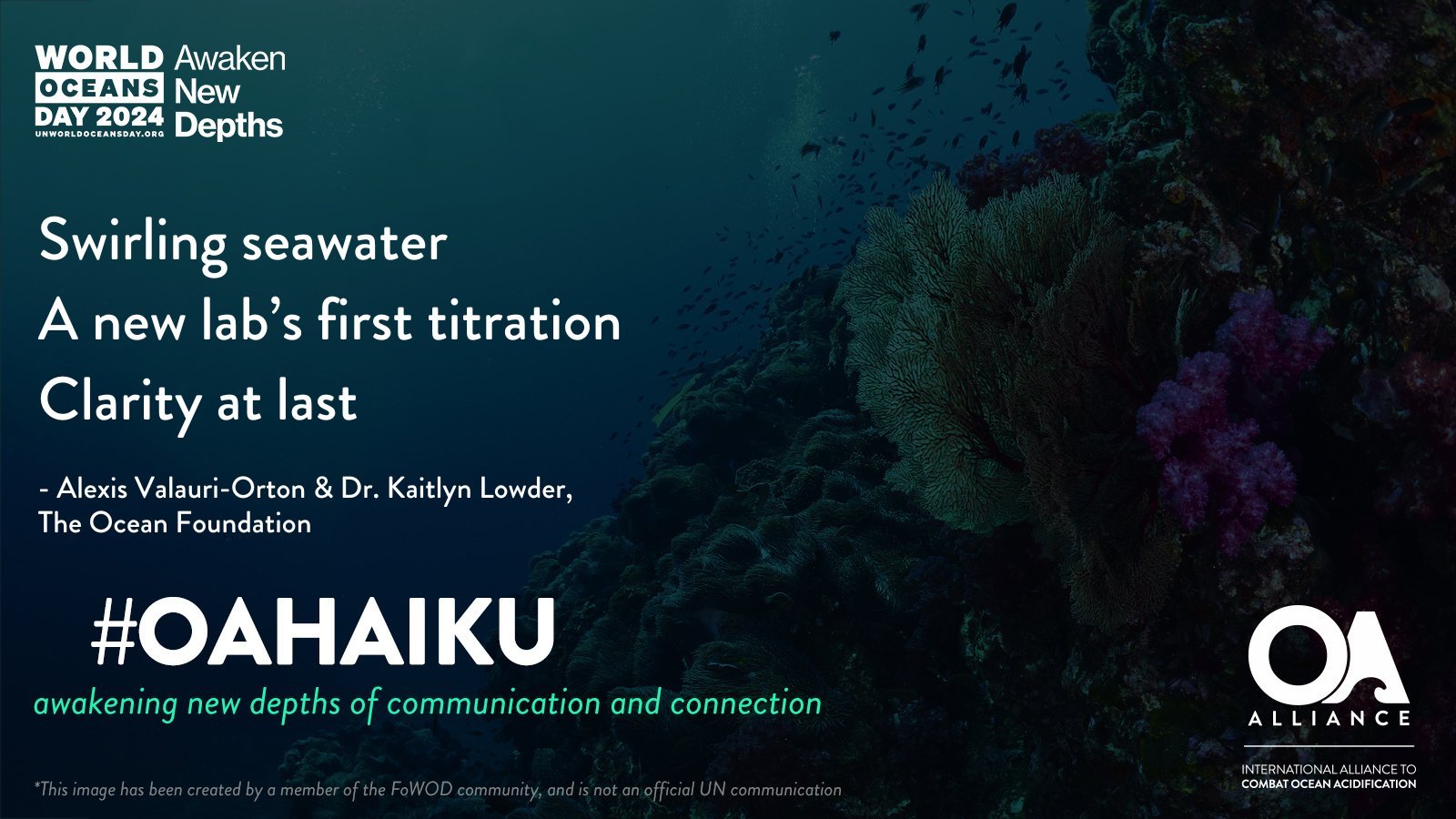
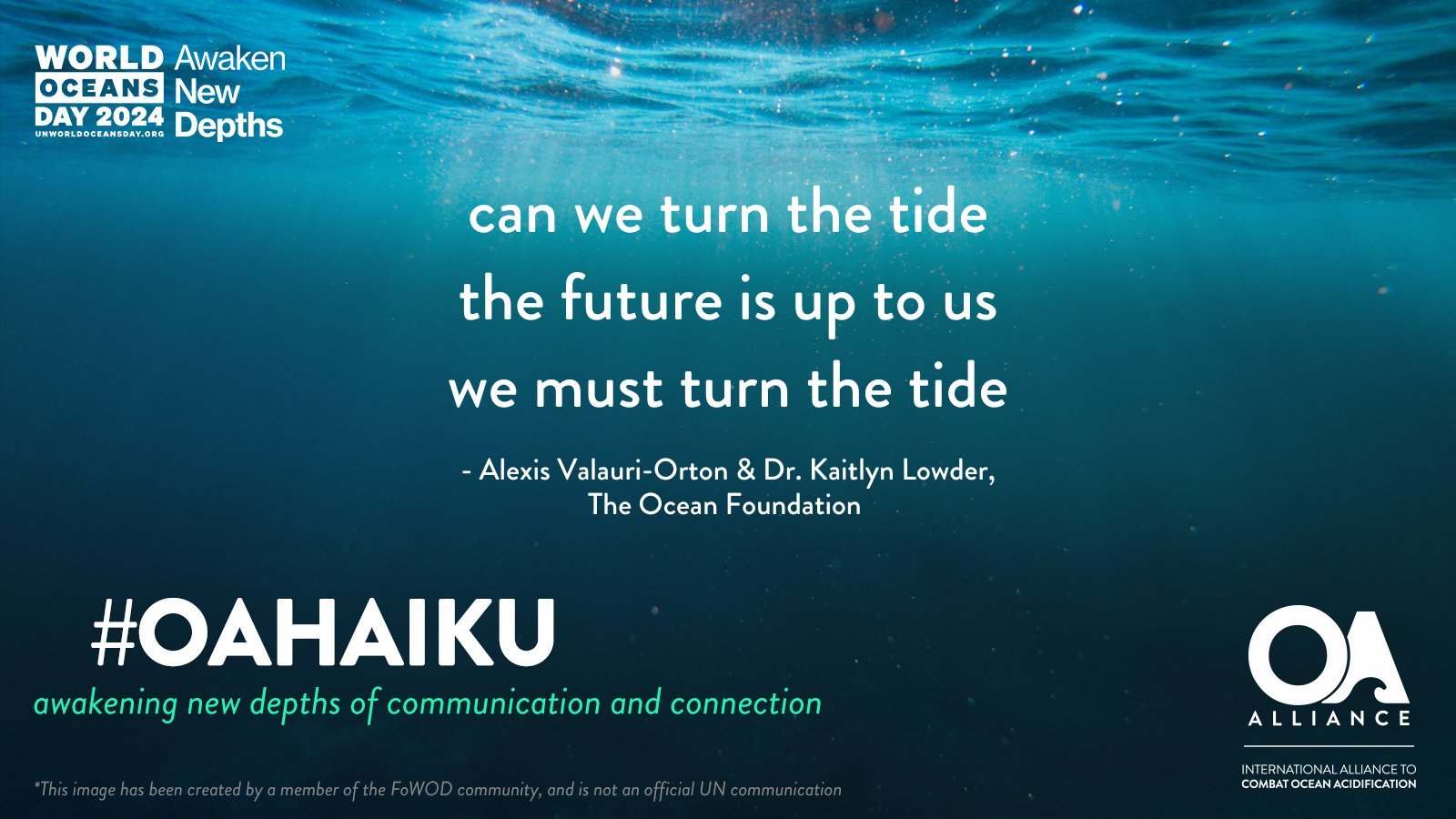
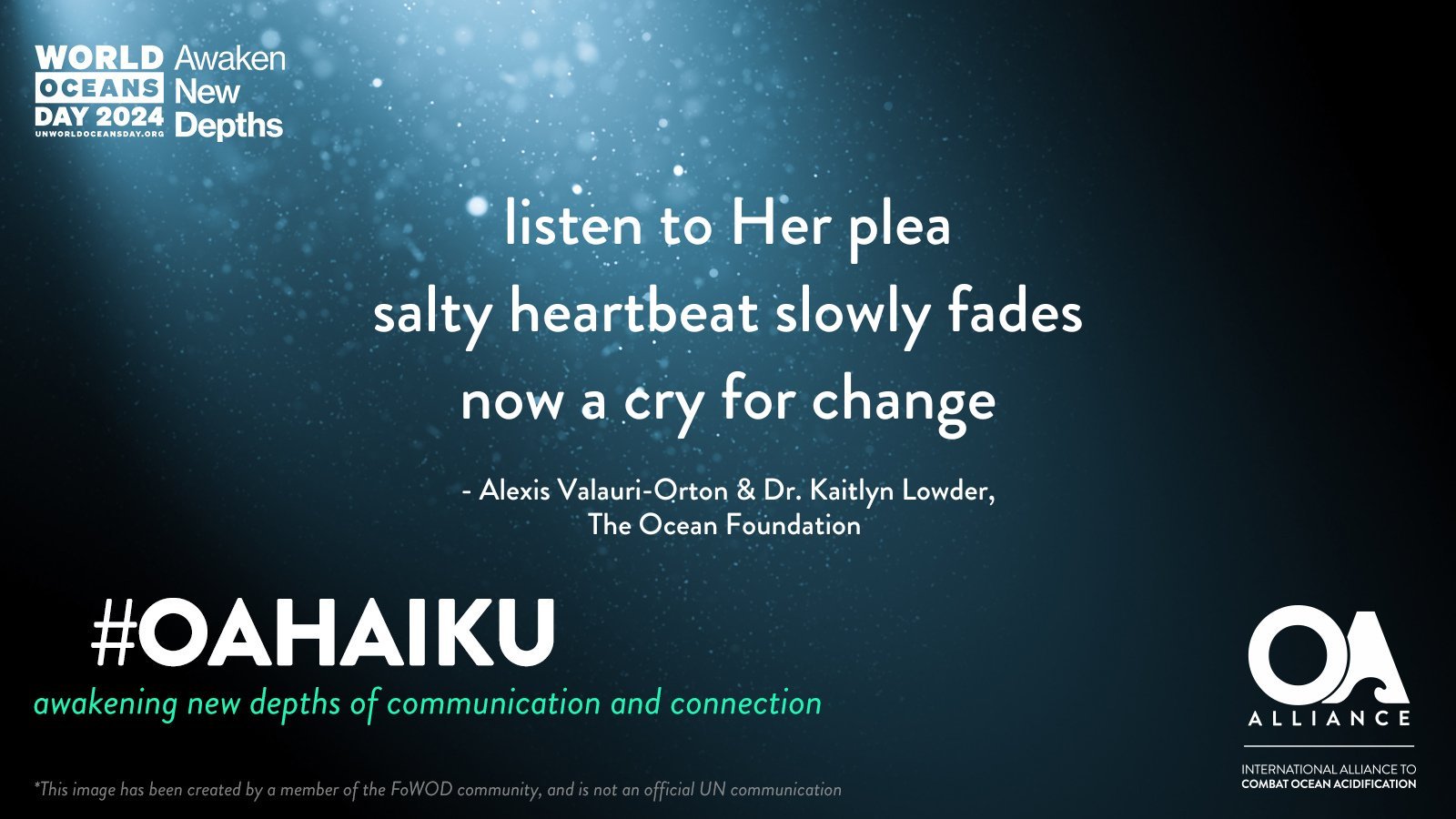






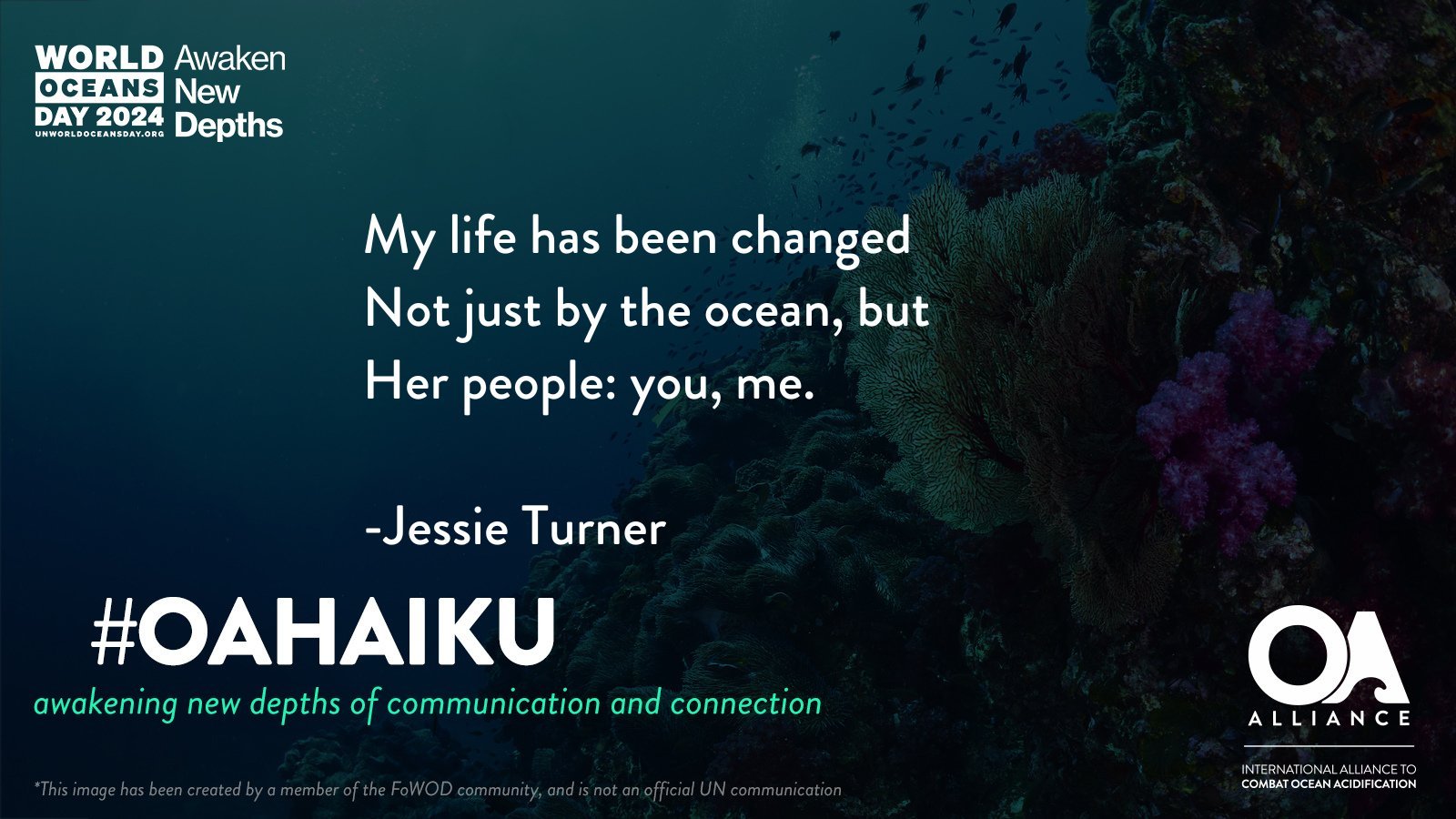
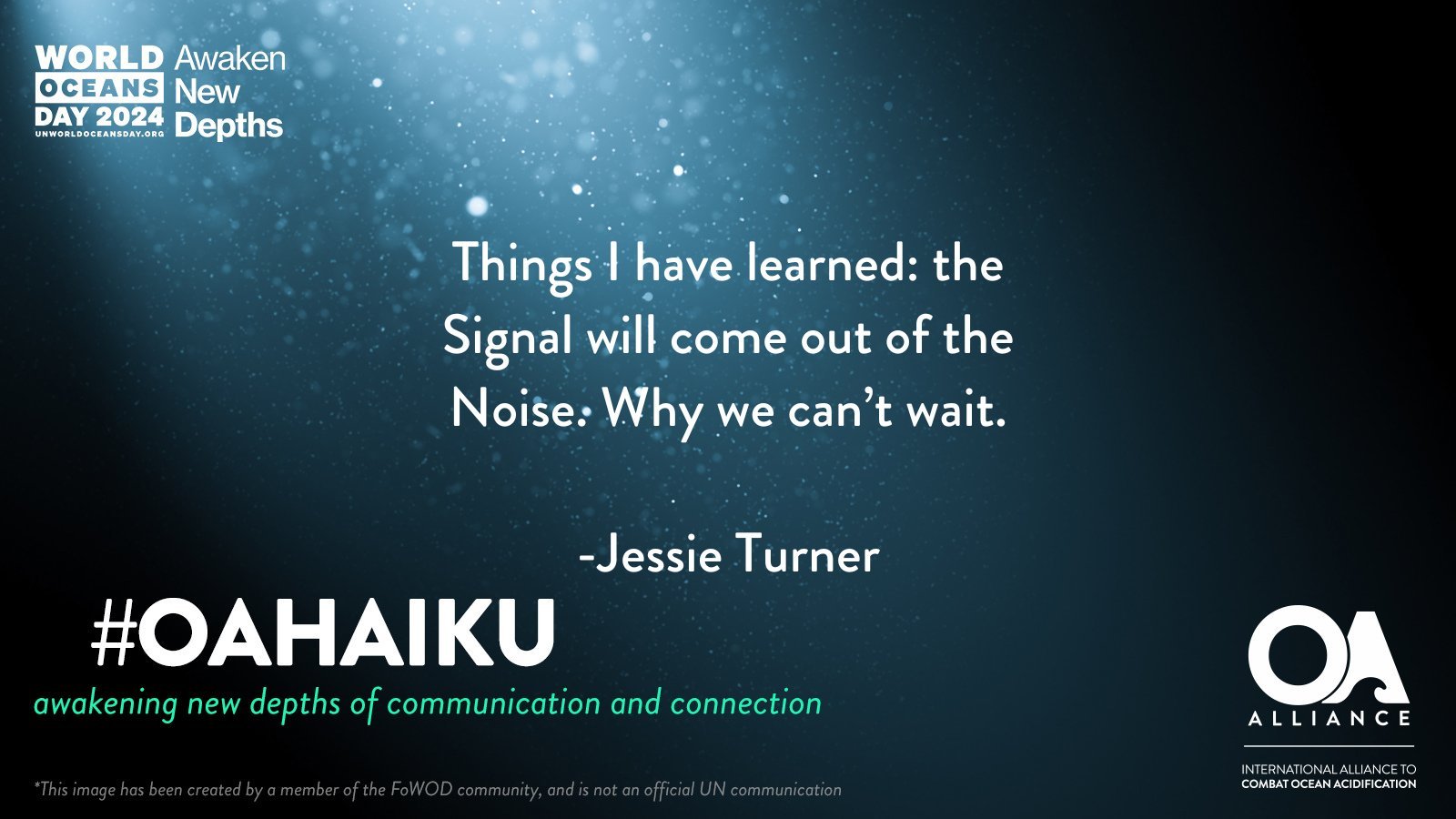
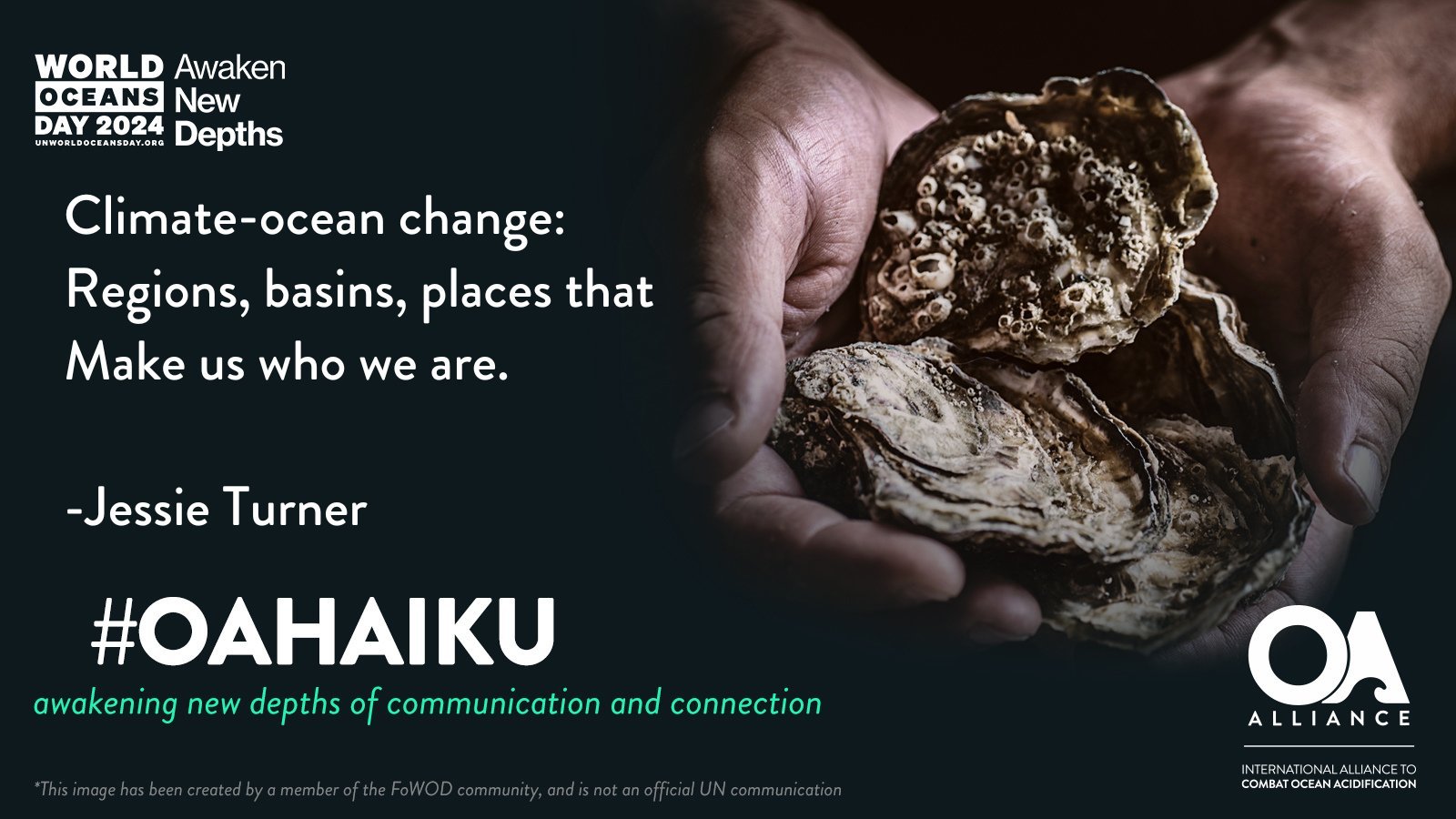
Follow the campaign on the OA Alliance’s x account
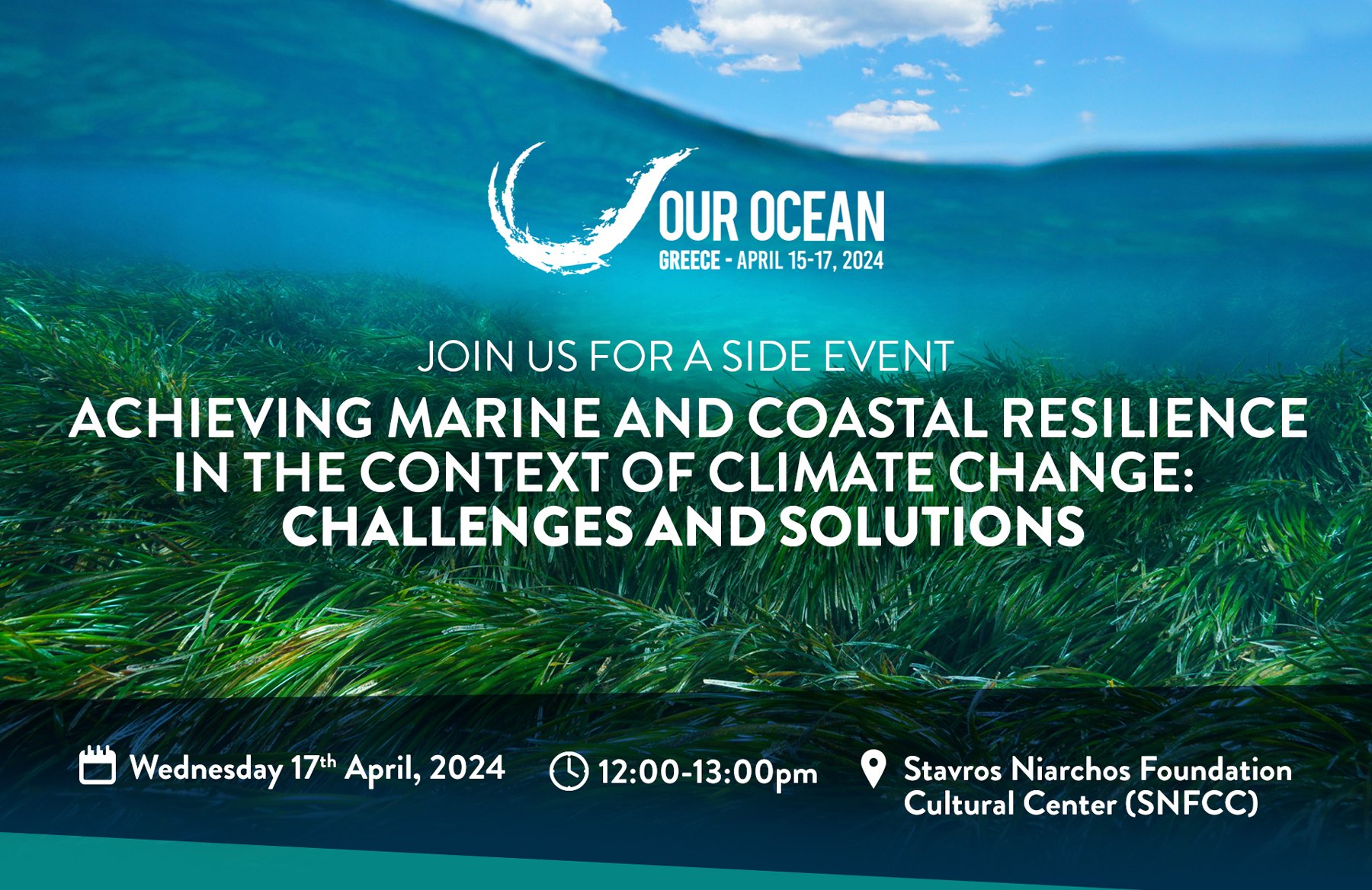
Our Ocean Conference: Achieving Marine and Coastal Resilience in the Context of Climate Change
The OA Alliance was launched in 2016 at the 2nd Our Ocean Conference held in Washington D.C. under the leadership of then U.S. Secretary of State John Kerry. We are proud to continue engagement at the 9th Our Ocean Conference, join us!

Our Ocean Conference: Ministerial Meeting National OA Action Planning Leadership Circle
The OA Alliance was launched in 2016 at the 2nd Our Ocean Conference held in Washington D.C. under the leadership of then U.S. Secretary of State John Kerry. We are proud to continue engagement at the 9th Our Ocean Conference, join us!
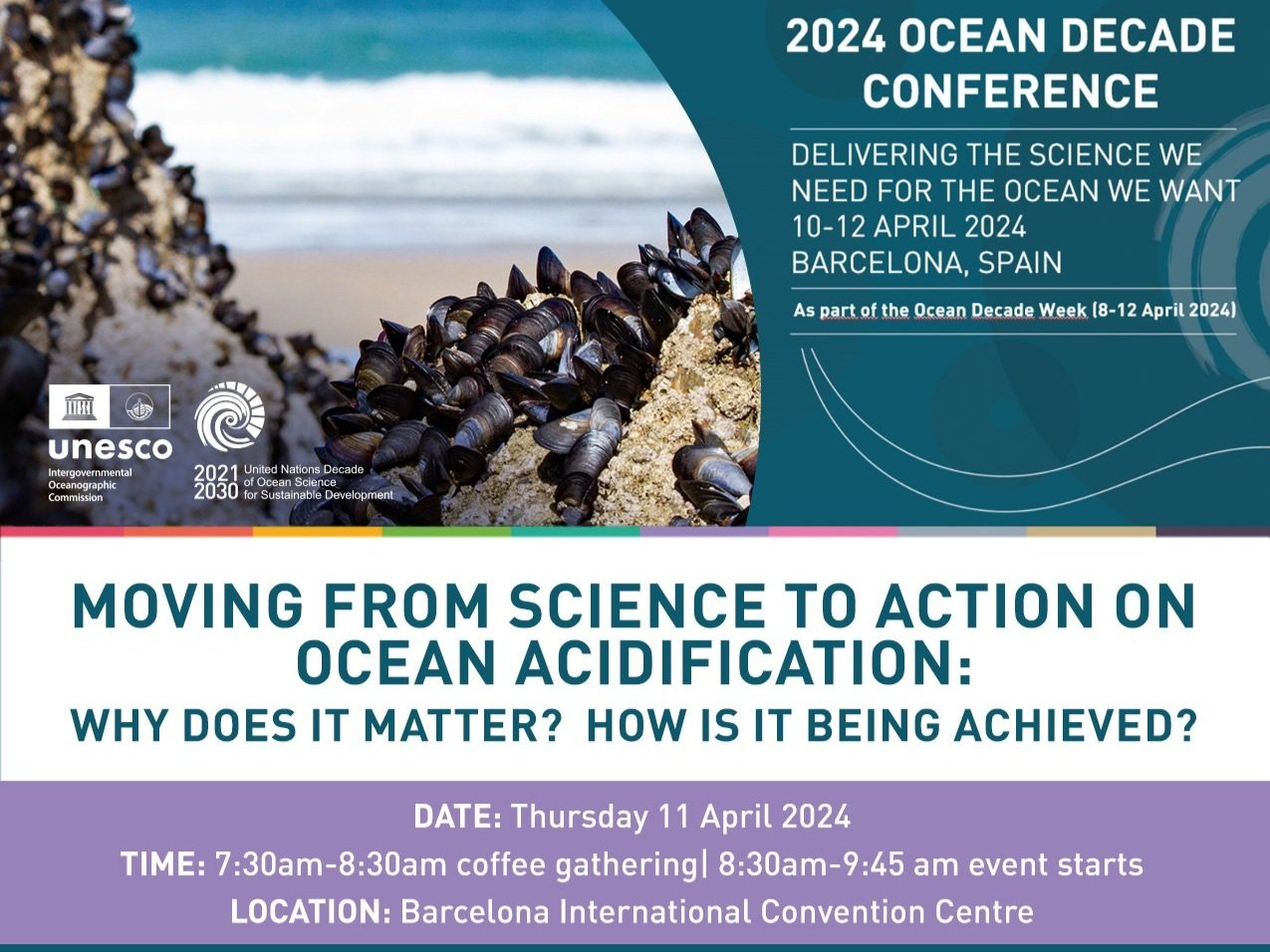
UN Decade of Ocean Science Conference
You are invited to join us for an ocean acidification event at the UN Decade of Ocean Science Conference taking place in Barcelona April 10-12, 2024.
“Moving from Science to Action on Ocean Acidification: Why Does It Matter? How Is It Being Achieved?” will occur on April 11 between 8:30am-9:45am (with 7:30am coffee) at the Barcelona International Convention Center, Meeting Room 133-134 Southern Ocean, Floor P-1.
The event is co-hosted by the IAEA, OA Alliance, and NOAA in partnership with GOA-ON and OARS.
Please use this registration link to express your interest in attending.
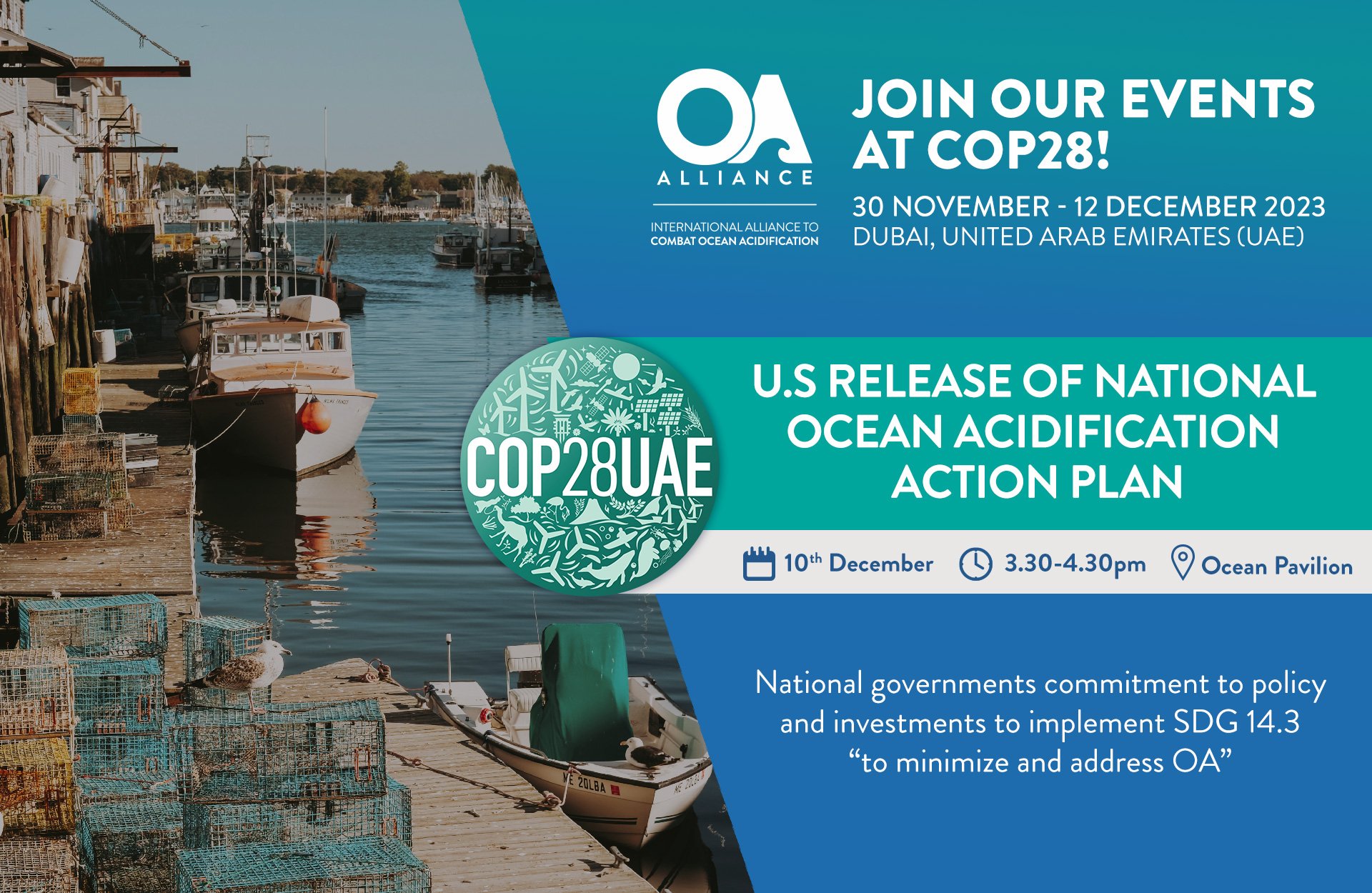
National governments commitment to policy & investments to implement SDG 14.3
OA Action Plans call forth renewed ambition to realize mitigation and adaptation targets already in place across UNFCCC and deliver on Sustainable Development Goal 14.3, “to minimize and address ocean acidification.” Additionally, OA Action Plans help prioritize science, policy, and funding needs across the UN Decade of Ocean Science for Sustainability.
On 10 December, the United States announced the release of the U.S. Ocean Acidification (OA) Action Plan during a COP28 side event at Ocean Pavilion co-hosted by NOAA Ocean Acidification Program, U.S. Department of State, and OA Alliance.
The U.S. is calling on more national governments to create OA Action Plans by the UN Ocean Conference 2025 and support implementation of SDG 14.3, "to minimize and address OA."
WATCH THE FULL SIDE EVENT HERE
Speakers included:
Dr. Mahlet Mesfin, Deputy Assistant Secretary, Bureau of Oceans and International Environmental and Scientific Affairs, U.S. State Department
Dr. Richard Spinrad, Administrator of the U.S. National Oceanic and Atmospheric Administration
Ambassador Anna Lindstedt, Ministry of Foreign Affairs, Sweden
Ms. Emilie Rojas Margolliet, Ministry of Foreign Affairs, Chile
Ms. Gabrielle Larricq, Directorate of European and International Affairs France
Dr. Armando Francisco Arias-Isaza, Institute for Marine and Coastal Research, Colombia
Congressman Eduardo Murat Hinojosa, Mexican Chamber of Deputies
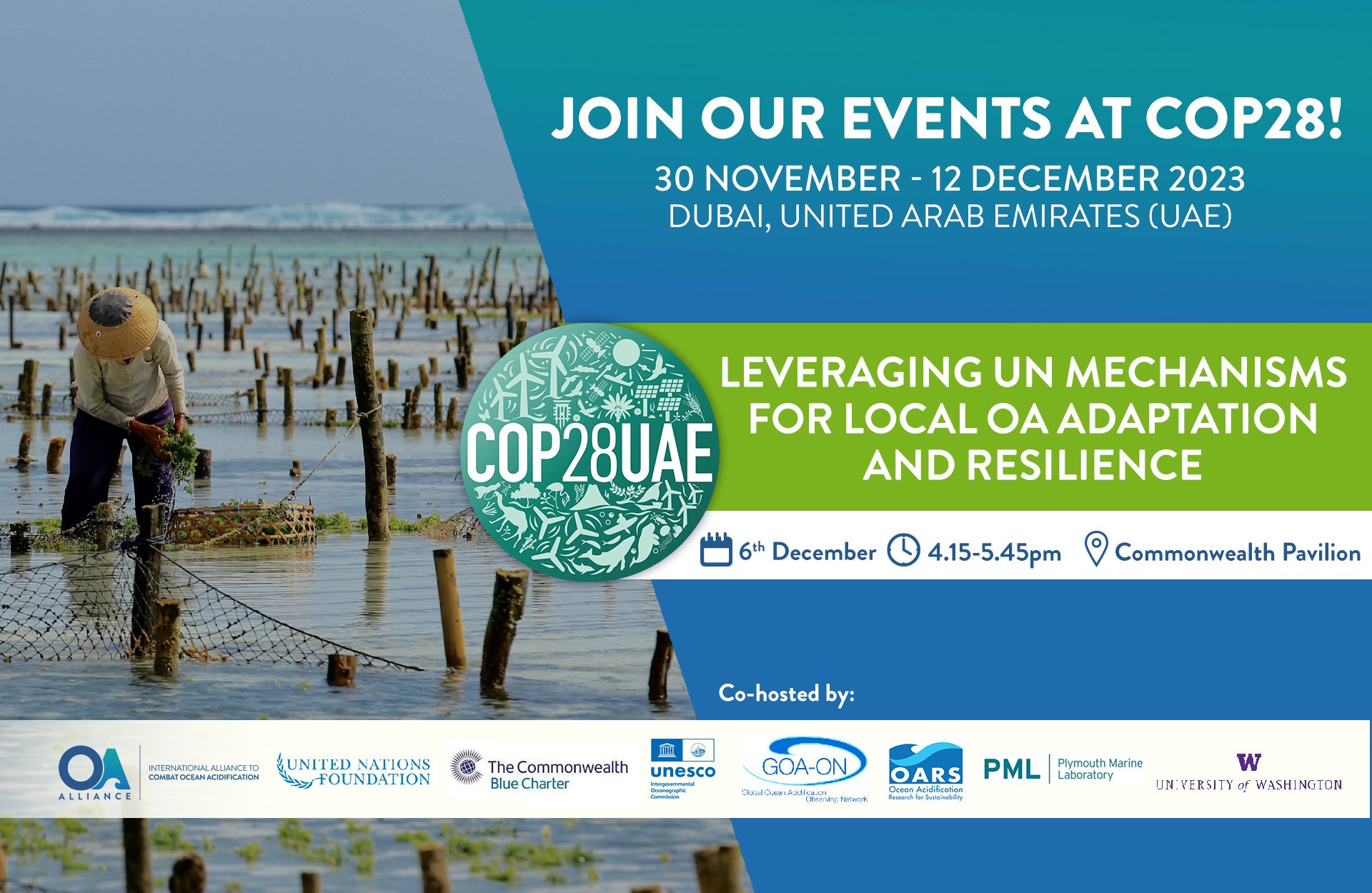
Leveraging UN Mechanisms for Local OA Adaptation and Resilience
Date: 6 December
Time: 4.15pm -5.45pm
Location: Commonwealth Pavilion
Co-hosted with: UN Foundation; IOC-UNESCO; Plymouth Marine Laboratory; Ocean Decade Programme ‘Ocean Acidification Research for Sustainability; Commonwealth Secretariat; Global Ocean Acidification Observing Network and University of Washington
Overview: Despite dire warnings from the Intergovernmental Panel on Climate Change, the impacts of ongoing ocean warming, acidification, and deoxygenation caused by increased GHG and carbon dioxide emissions are often misunderstood or not reflected across mainstream climate mitigation or adaptation priorities across the UNFCCC or domestically.
Panelists discussed food security, adaptation and financing concerns associated with OA and highlighted the science, policy, and further investments needed to respond. The event launched the OA Research for Sustainability UN Decade Programme Commitments Page.
WATCH THE EVENT HERE.
Speakers:
Cristina Rumbaitis de Rio, Director of Adaptation, UN Foundation
Dr. Tarub Bahri, Fisheries and Aquaculture Department, Food and Agriculture Organization of the UN
Mr. Euan Low, our Climate Impact Area Lead, Green Climate Fund
Tiago Pitta e Cunha has been Chief Executive Officer of Oceano Azul Foundation, Oceano Azul Foundation
Nicholas Hardman- Mountford, Head of Ocean Governance and Natural Resource Management Commonwealth Blue Charter
Professor Steve Widdicombe, OARS Secretariat. UN Decade of Ocean Science, Ocean Acidification Research Programme
Ms. Paula Faiva, Director of Ministry of Climate, Oceans & Resilience, Government of Tokelau
Dr. Kalina Grabb, National Oceanic and Atmospheric Administration, USA
Ambassador Peter Thomson, UN Special Envoy to the Ocean

Leading on OA Monitoring, Policy Mainstreaming and Finance in the Pacific
Date: 4 December
Time: 3.00-3.50pm
Location: Moana Blue Pacific Pavilion
Co-hosted with: U.S. NOAA Ocean Acidification Program, U.S. State Department, The Ocean Foundation
Overview: The Pacific Islands region is leading on ocean acidification (OA) knowledge generation by developing regional monitoring and research programs that can be leveraged in the future to inform climate-ocean mitigation, adaptation, and resilience priorities.
On 4 December, the OA Alliance co-hosted a discussion at the Moana Blue Pacific Pavilion, "Leading on OA Monitoring, Policy Mainstreaming and Finance in the Pacific." The event was co-hosted with U.S. NOAA Ocean Acidification Program, U.S. State Department, and The Ocean Foundation.
The event was an opportunity to share out goals, partnerships, and successes of the Pacific Islands Ocean Acidification Centre (PIOAC), alongside needs for increased science, policy mainstreaming and financing.
WATCH THE EVENT HERE.
Speakers:
Office of the Prime Minister, Climate Finance Specialist, Mr. Ravneeth Dewan, Fiji
Ambassador Peter Thomson, UN Special Envoy to the Ocean
Mr. Exsley Taloiburi, GEM Division Deputy Director of Pacific Community
Dr. Kalina Grabb, U.S. National Oceanographic and Atmospheric Administration
Ms. Alejandra Navarrete, Government and Multilateral Officer, The Ocean Foundation

COP28
The 28th Conference of the Parties (COP28) will meet 30 November - 12 December as part of United Nations Framework Convention on Climate Change (UNFCCC).
COP28 presents a critical opportunity to reflect on where we are in meeting goals and targets of the Paris Agreement and to chart an ambition path forward for climate-ocean action.
Importantly, COP28 marks the first ever Global Stocktake, a process by which country signatories to the Paris Climate Agreement take inventory of activities that have occurred to reduce climate change causes and impacts, identify gaps, and accelerate actions to meet our greenhouse gas and carbon reduction goals.
It is critical that ocean information be clearly articulated in this year’s Global Stocktake. That's why we teamed up with the Ocean Climate Platform, the Ocean Conservancy and multiple partners to release recommendations for “Integrating the Ocean: Options for the CMA 5 Decision on the Global Stocktake."
COP28 President, the United Arab Emirates, is driving global attention on adaptation needs to transform and protect food systems in response to climate change.
Climate-ocean change threatens food security. This matters to all of us, but especially communities that depend on marine species for food, economies, and cultural practices or traditions.
Luckily, the UNFCCC has created an Ocean and Climate Dialogue to discuss options for strengthening ocean mitigation and adaptation measures in response to the mounting impacts of greenhouse gases on our marine resources and environments.
The OA Alliance has specific recommendations to protect seafood security and sovereignty through UNFCCC, which you can read more about here.
Members and partners of the OA Alliance will be convening a number of side events at COP28 focusing on increasing ambition for climate action to protect marine and aquatic seafood in addition to the financing needed to support countries in better information that support unique adaptation measures along their coastlines.
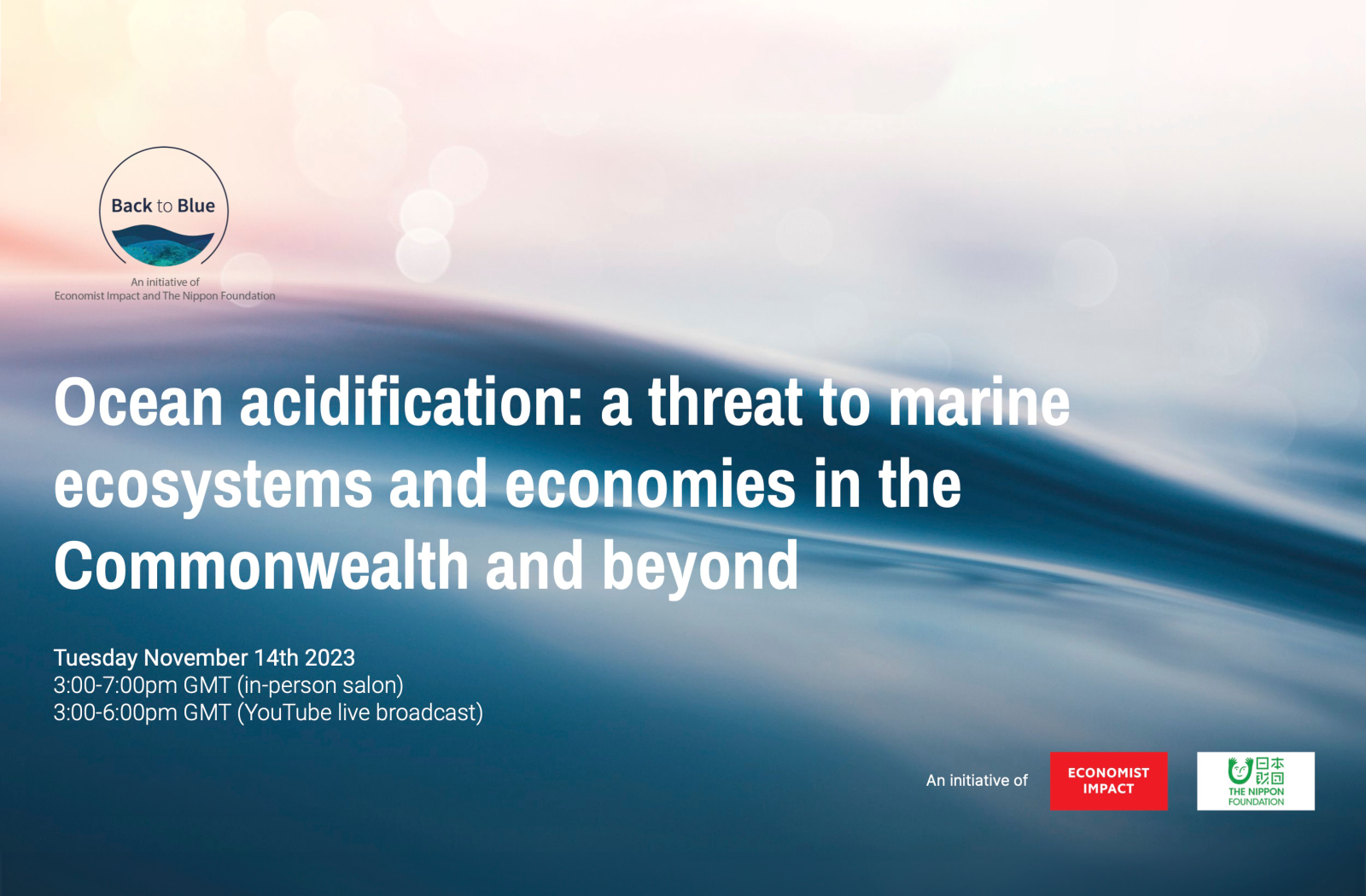
Ocean acidification: a threat to marine ecosystems and economies in the Commonwealth and beyond
The ocean absorbs up to 30% of annual carbon emissions, resulting in a fall in the pH value of its seawaters, thus signifying a rise in their acidity. The past 20–30 years have seen a rapid increase in ocean acidification and, unless decisive actions are taken to mitigate this, it will continue to rise. This event will bring together policymakers, scientists and other ocean experts from within and outside of the Commonwealth to discuss this growing crisis. It will explore the threat ocean acidification poses to marine ecosystems; identify what’s at stake for economies, communities and individuals; and highlight best practices that can help stem its tide.

OA Week 2023: Updates on Law and Policy Related to Ocean Acidification
Join us in our session at the Ocean Acidification week 2023!
The Global Ocean Acidification Observing Network (GOA-ON) will be hosting OA week between 30 October- 3 November, 2023. This virtual symposium will bring together researchers across the world with sessions, plenary speakers, and engaging talks about ocean acidification research to support OA mitigation, adaptation and improved management of ocean and marine resources.
The OA Alliance will be hosting a session aiming to discuss: Updates on Law and Policy Related to Ocean Acidification. The session will include:
National OA Action Plans to support domestic climate, ocean, and marine management goals.
Projects designed to integrate OA information across mainstream policies in Europe and the Western Indian Ocean.
Update on OA aspects across UNFCCC, UN SDG 14 and Convention on Biological Diversity.
Date: Tuesday, 31 October, 2023
Time: 6am PST; 9am EST; 2pm BST; 3pm CET; and 11pm in Tasmania
Duration: 90 minutes
We will have speakers from NOAA’s OA Program alongside law and policy practitioners advancing OA projects in Europe and Africa. Learn more about OA Alliance projects: Exploring Marine Management And Policy Response To Ocean Acidification in the EU and Mapping OA Monitoring And Research Recommendations To Policy In Africa, respectively.
Save the date and register by following this link:

Climate Week: Accelerating Implementation of U.S. Climate-Ocean Policy
Join us at Climate Week 2023!
This 90-minute meeting will bring together coastal U.S. states on the front lines of climate-ocean change to discuss turning policy priorities into aligned actions and shared investments.
Event Overview
Federally, the U.S. has led domestic and international leadership on climate-ocean change knowledge and response. On March 21, 2023 the U.S. government released President Biden’s Ocean Climate Action Plan.
U.S. states have been transforming climate-ocean policy by assessing regional risks, prioritizing information needs, incorporating coastal habitats into climate mitigation planning, and formulating local actions to support coastal and community resilience.
This working meeting will bring together U.S. states and federal practitioners around the themes of blue carbon ecosystems; and climate resilient marine resources and coastal communities.
Outcomes include: (1) identification of shared priorities or state/regional needs; (2) recommendations to the federal government in implementing related activities of the Ocean Climate Action Plan; (3) funding to support regional or state programs/ projects.
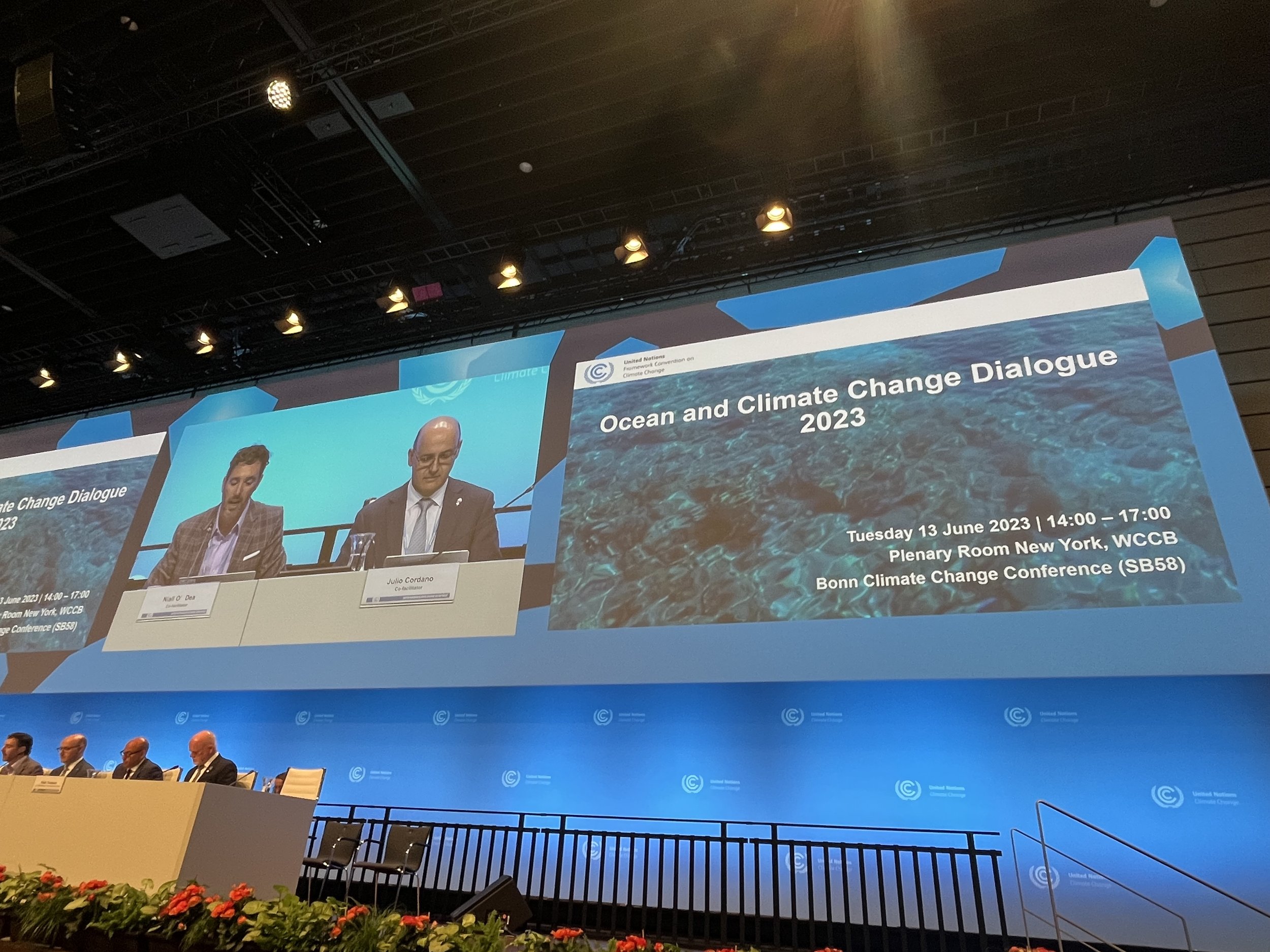
UNFCCC Ocean and Climate Dialogue
Building upon previous editions, this year’s Ocean and Climate Dialogue 2023 is being held June 13-14 in Bonn, Germany as part of the UNFCCC Subsidiary Body for Scientific and Technological Advice.
The Dialogue will be co-facilitated by Chile and Canada and focus on: (1) the role of coastal ecosystem restoration, including blue carbon ecosystems; and (2) fisheries and food security in the context of climate change.
We know that UNFCCC bodies and mechanisms can be leveraged to ensure adequate and equitable investments in climate-ocean change information, gaps analysis, and capacity or technology transfer that result in better preparedness, mitigation, and adaptation choices for all Parties—particularly as relates to food security and sovereignty.
The OA Alliance will be engaging in the upcoming Ocean and Climate Dialogue, sharing our recommendations to strengthen UNFCCC response to ocean warming, acidification, and deoxygenation.
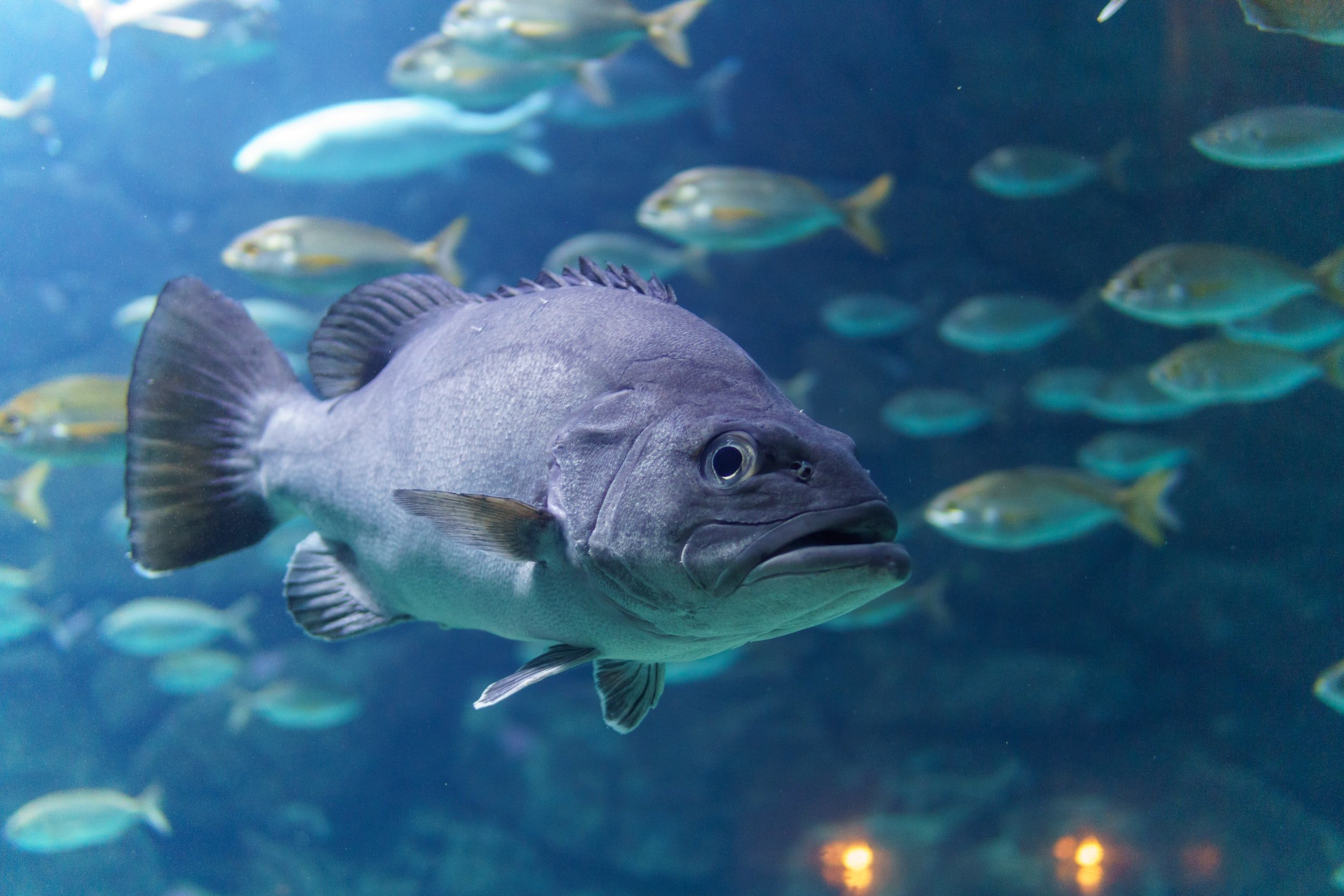
Exploring Marine Management And Policy Response To Ocean Acidification
Join Us For
A side meeting on the margins of European Maritime Day 2023
Exploring Marine Management and Policy Response to Ocean Acidification
24 May 2023
7:30am-9:30am
Club House room at Marina du Chateau (Quai Eric Tabarly, 29200 Brest, France)
Overview
European Maritime Day 2023 (EMD) is taking place in Brest, France between 24-25 May. The EMD is being organised by the European Commission, the City of Brest, the Region of Brittany, the department of Finistère and the General Secretariat for the Sea. It will explore the current state of play on a broad range of issues concerning the blue economy and the marine environment and discuss ways of moving forward. Specific themes include:
Aquaculture and fisheries
Responsible food systems and biodiversity
Marine research, innovation, technology and observation
Maritime Spatial Planning
Civil Society and stakeholder relations
To support these themes and advance the integration of climate change information across key European marine management frameworks, the International Alliance to Combat Ocean Acidification (OA Alliance), OSPAR Convention Intersessional Correspondence Group on OA (ICG-OA), and NE Atlantic Hub of the Global Ocean Acidification Observing Network (GOA-ON) will convene a 2-hour meeting, “Exploring Marine Management and Policy Response to Ocean Acidification.”
Meeting Focus
Themes of the workshop focus on maritime policies including the Marine Strategy Framework Directive and Water Framework Directive or national equivalents in non-EU member states; marine spatial planning; applying cumulative impact assessments to ecosystems-based management; safeguarding European marine economies in the context of climate change.
The meeting will bring together policy and decision-makers across Europe for brief presentations and breakout discussions of:
OA trends, biological impacts and threats to keystone fisheries and aquaculture within the Arctic, North Atlantic and Mediterranean.
Reporting and OA recommendations by OSPAR's Intersessional Correspondence Group on OA (ICG-OA) in OSPAR’s Quality Status Report 2023 as well as national response strategies.
EU and national ocean and marine policy frameworks (including the Marine Strategy Framework Directive, Water Framework Directive and Marine Spatial Planning efforts) that can be leveraged to characterize, address, and minimize ocean and coastal acidification.
Who Should Attend: invitees include climate and environment policy leads, water quality and monitoring programs and marine managers representing delegations from European nations bordering a sea or ocean.
Why Attend: communities across the NE Atlantic, Baltic Sea, Black Sea, and Mediterranean Sea are already experiencing negative impacts of climate change on habitat and biodiversity, fisheries and aquaculture, economies, cultural practices, and livelihoods. These impacts will worsen in the future without interventions from managers and decision makers across marine, coastal and climate policy themes.
Ocean warming, acidification and deoxygenation have gained increasing recognition across international policy platforms including the UN Framework Convention on Climate Change, the UN Sustainable Development Goal Agenda, Convention on Biological Diversity and High Seas Treaty.
To date, international science coordination has emphasized enhancing coastal observations, establishing regional baselines, contributing to global indicators, and broadly developing research around keystone species.
While this work must continue across different scales, national governments and end-users can leverage and apply targeted information to support discrete choices about localized mitigation, adaptation, and preparedness strategies in the face of ongoing climate change.
Specifically, OA information can be used to support or evaluate marine management targets, evaluate ecosystem-based approaches, assess cumulative impacts to EEZs and coastal zones, and tailor mitigation or adaptation responses to potential interference of ecosystem services caused by climate change.
Outcomes of Workshop: As the science, research and observed impacts of climate-ocean continue to grow, there is a need for increased knowledge exchange and expertise on the substance and process for developing local, regional, and national marine management and policy responses in the face of cumulative change.
Specific outcomes of this workshop include:
Exploring what role OA information should play in the updated Marine Strategy Framework Directive.
Improving understanding of ecosystem-based management and Good Environmental Status in the context of climate-ocean change.
Leveraging European (national or EU) management and policy frameworks to take-up regional seas conventions recommendations, such as those by OSPAR’s ICG-OA, and further prioritize ongoing Convention mandates or reporting on OA.
White paper recommendations/ suggested European marine management and policy mapping to support national governments and the European Commission in further integrating climate-ocean change information across myriad blue economy targets, sustainable fisheries and aquaculture goals, nature-based solutions, and coastal management decision frameworks.
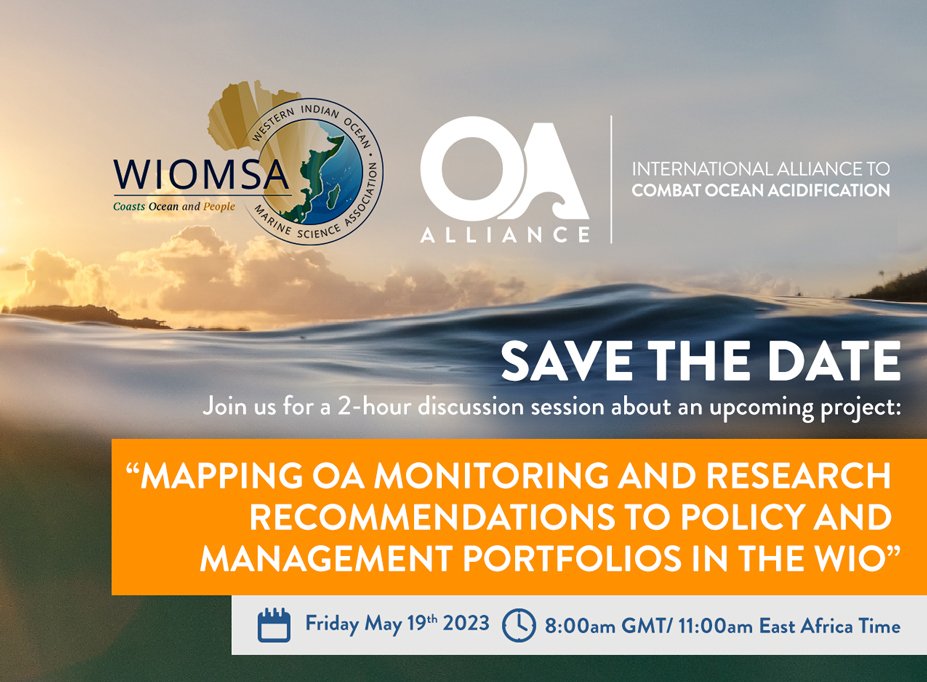
Mapping OA Monitoring and Research Recommendations to Policy in Africa
Join us for Mapping OA Monitoring and Research Recommendations to Policy in Africa
May 19 between 11:00am-1:00pm East Africa Time in Tanzania
The OA Alliance is partnering with the Western Indian Ocean Marine Science Association (WIOMSA) on a project that will contribute towards enhancing OA monitoring, research, and vulnerability assessments in the WIO region, by illuminating their relationship to consequential policy goals.
The discussion flows from a Western Indian Ocean Acidification OA monitoring project established by WIOMSA with regional institutions and experts. The project resulted in the WIO OA report in 2022. Next steps including expanding the monitoring programme and ensuring that these efforts will inform ocean policy, management and adaptation in the future.
We would love to have you join us and learn more about this effort and implications for regional policy, management and funding.
Please register via this google survey link so that we can send you the zoom link + agenda.

Our Ocean Conference: Meeting of Members and Partners
On March 3, the OA Alliance hosted a meeting of members and partners to discuss needs and opportunities for advancing OA actions across international and domestic agendas.
Attendees heard opening remarks from United States, Deputy Assistant Secretary for Oceans, Fisheries and Polar Affairs, Professor Maxine Burkett who spoke about the need for ongoing climate ambition and integration of climate-ocean policies across mitigation and adaptation themes. Professor Burkett spoke about the recently released U.S. Ocean Climate Action Plan which aims to: (1) create a carbon-neutral future; (2) accelerate solutions that tap the power of natural coastal and ocean systems to absorb and store greenhouse gases, reduce the climate threat, and protect communities and ecosystems against unavoidable change; and (3) enhance community resilience.
The U.S. government’s commitment to developing an OA Action Plan is well defined on page 24 and page 44 of the new report.
OA Alliance Director, Ms. Jessie Turner, gave an overview of activities, products and programmatic focus areas which support answering the following questions.
What’s needed to advance ocean acidification leadership internationally?
· UNFCCC Ocean and Climate Dialogue/ Adaptation and Financing Schemes
o (Leveraging NDCs and NAPs)
· Example solutions/ projects to address mitigation and adaptation needs
o (SDG 14)
· Increased financing at regional scales
o (GEF/ GCF/ UNEP/Development Banks/ Private)
What’s needed to support OA Action Planning and preparedness domestically?
· Regional monitoring and coastal information
· Inventory of relevant policies and management mechanisms
· Prioritization of highly vulnerable sectors and resources
· Finance plan for implementation
Finally, the group engaged in a discussion lead by Dr. Richard Spinrad, Under Secretary of Commerce for Oceans and Atmosphere, United States NOAA and governmental colleagues in Norway, Germany, United Kingdom, Portugal, and Mexico alongside non-government partners like PEW Charitable Trust, The Ocean Foundation, World Resources Institute, Peace Boat and the Seattle Aquarium.
Topics of discussion included the need for increased examples of OA adaptation and resilience; better storytelling about the impacts and solutions to climate-ocean change; and identifying areas where OA information can guide management and policy including:
Nationwide or regional vulnerability assessments.
Strengthening early warning systems and climate preparedness strategies.
Guiding climate-response fisheries management plans.
Targeting areas for marine and coastal habitat restoration or conservation.
Enhancing coral reef health.
Determining effective aquaculture adaptation strategies.
Developing, testing, and deploying nature-based solutions.
Reducing nutrient run-off from specific sources.
Strengthening water quality regulations.
Aggressively and urgently reducing CO2 emissions.
Thank you to all our members and partners who are leading discussions around OA action taking!
Links to additional products and programmes referenced during the meeting:
OA Alliance Submission to the UNFCCC Ocean and Climate Dialogue in 2022 + specific adaptation/ finance recommendations for same.
Climate Financing for Ocean Adaptation breakfast meeting summary, hosted during UNOC 2022 in Lisbon, Portugal
OA Research for Sustainability UN Decade program
OA Action Plan Toolkit
Communications products/ posters
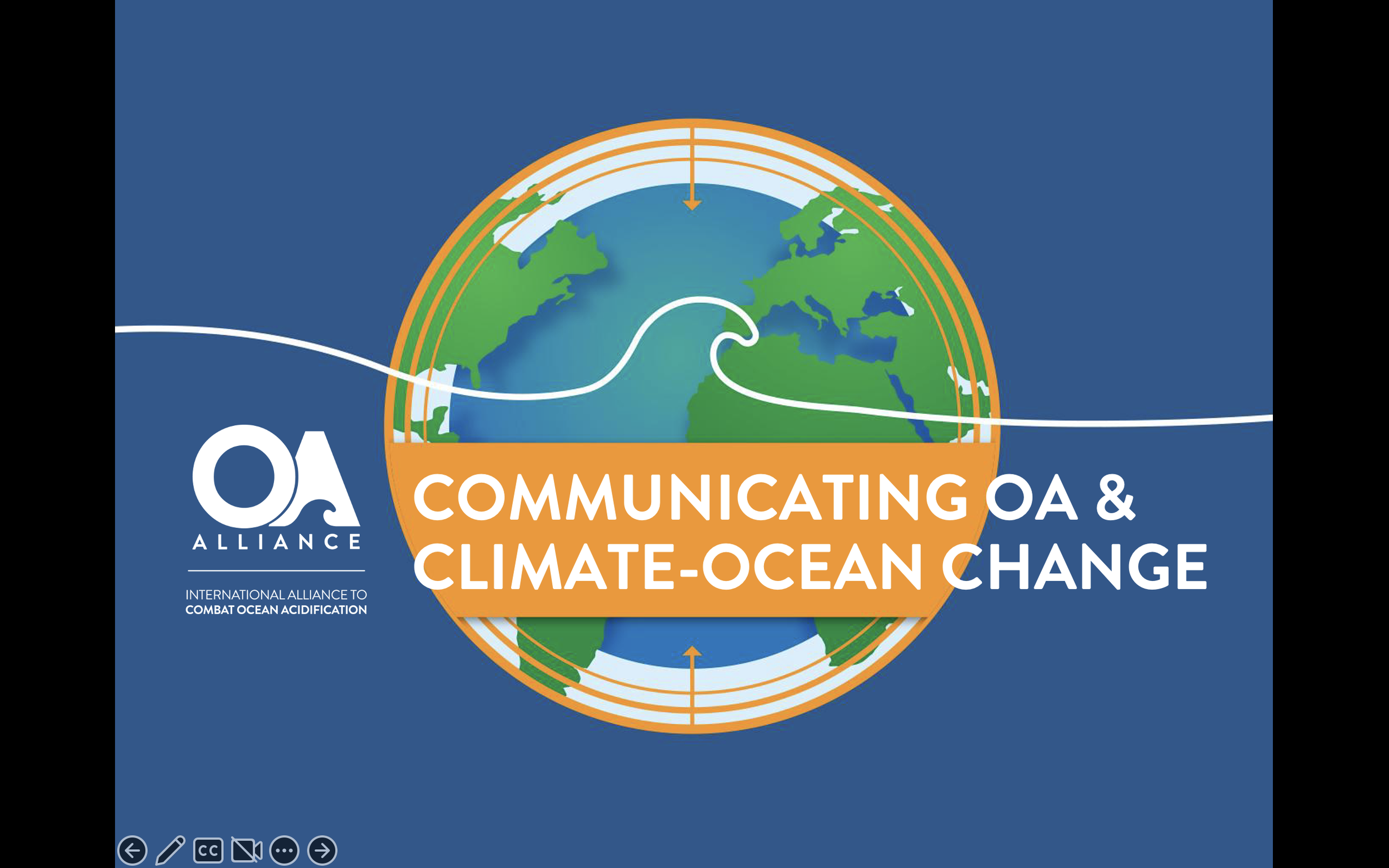
Communicating OA And Climate-Ocean Change: Panel Discussion With Practitioner
As interest in ocean acidification (OA) grows, we must be thinking about communicating OA for different audiences and outcomes, moving from describing “what is OA” and “why does OA matter” to “what can different actors do to address OA?”
On February 22, 2023 the OA Alliance hosted a webinar, ‘Communicating OA and Climate-Ocean Change’ in order to support our members and partners in developing calls to climate-ocean action.
It’s important that members of the OA Alliance have a strong narrative and understand the discrete outcomes they want to achieve through OA communication efforts.
The webinar provided an overview from the OA Alliance in developing calls to action. We shared learnings from participating in the 5th International Marine Science Communication Conference (CommOCEAN 2022). And finally, we heard from practitioners who are working on OA communications projects at local, regional, and international scales.
Our guests:
Mr. Salesa Nihmei, Secretariat of the Pacific Regional Environment Programme, Meteorology and Climate Officer, NZ Pacific Partnership on OA.
Nancy Hotchkiss, Pathways Collaborative, Oregon OAH Council Communications Project.
Austin Pugh, Canadian Community of Practice on OA, DFO/ NOAA bi-lateral comms collaboration.
Dr. Martha Sutula, Southern California Coastal Water Research Project.
Key takeaways:
We must move from describing ‘what is OA’ and ‘why does it matter’, to ‘what can different actors do to address OA’–whether through climate mitigation and adaptation targets, policy integration, management decisions and regulations, or targeted monitoring and research.
Audience, audience, audience. The most effective communications are demand driven, get to know your audience and understand their needs. What channels do they use to receive information? In what formats?
OA information and ‘calls to action’ are going to be discrete for different purposes, different actors and applicable at different scales.
The importance of cross-sectoral relationships, collaboration is key; scientists need support designing and achieving communications aspects of their projects.
The importance of Iteration, and consistency in our messages, climate-ocean narratives should be reinforced across the OA community of practitioners. We can make use of the communications tools already available to simplify our work.
Scicomms shouldn’t feel like an add-on or after thought to science, there should be more of an institutional culture to co-design comms with end users, promote and fund communications capacity.
Partners at SPREP in Samoa highlighted how communications are experienced in different ways depending on your context. In the Pacific region alone, there are about 2,000 distinct languages. It’s important to understand appropriate words to describe OA or other climate-ocean impacts and solutions.
RESOURCES REFERENCED:
OA Alliance posters and infographics including:
How Does OA Impact Services that Humans Depend On?
How Do You Measure Ocean Acidification?
What Do Policy Makers Need to Know?
What Can Local Governments Do?
What Can You Do to Address Climate-Ocean Change?
New Zealand Pacific Partnership on Ocean Acidification; and outreach materials including OA posters several translations for Vanuatu, Kiribati, Fiji, Niue, Tonga, Tokelau and Samoa.
The Oregon Coordinating Council on Ocean Acidification and Hypoxia (OAH Council) released its 2022 Biennial Legislative Report which includes actions taken by the Council as outlined in the State’s OAH Action Plan. In 2023, the OAH Council is taking on a larger communications project to identify audiences and calls to action associated with implementing and supporting the OAH Action Plan.
The Canadian Community of Practice on Ocean Acidification was initiated in 2018 and is sponsored by the Marine Environmental Observation Prediction and Response (MEOPAR) Network. MEOPAR Communities of Practice bring together researchers, practitioners, policy-makers, and community members to share expertise, to learn, and to provide a space for discussion and co-production of knowledge. New resources are being released on specific projects that assess social and economic vulnerability of key species in Canada, including Atlantic Sea Scallops. Learn more and check out projects here.
Frameworks Publications and Guidelines: How to Talk about Climate Change and the Ocean

